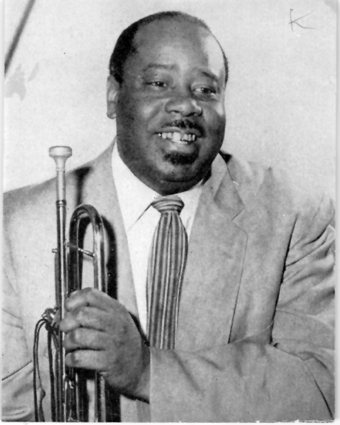
Revision note: We have added material about King Kolax's involvement with Stepheny Records. From research by Armin Büttner, plus a reminder from Alex Podlecki, we've corrected the date on the session for Weirton Records (it was done in June 1958) and added a bio of the company's proprietor, one Weird Dock Gibbs. We've finally determined what instrument William Corti played on the Jerry Butler session from 1961. He was a trombonist. We've further updated our coverage of Stepheny 1814 (a single that King Kolax played on) and of Stepheny 1821 (a single that King Kolax was wrongly thought to have played on). We've confirmed that Stepheny 1821 was released in March 1958, while it turns out Stepheny 1814 was released in October 1957. We strongly recommend David Sherr's updated reminiscences, "Stories from the Road" at http://belairjazz.org/stories-from-the-road.html#, which include his encounter with King Kolax. We have pinned down the release date for Duke 172 by Brooks and Brown (to May 1957). We have learned of a second release on Ace, the Miltone subsidiary, from King Kolax's only big band recording session. A copy of the first release from this session finally showed up at an auction and is now in the collection of Robert L. Campbell. We can confirm that the session took place in Los Angeles, in February 1947, and that John Coltrane (then playing first alto saxophone in a 17-piece Kolax band) received composer credit for "True Loving Blues." Mysteries remain; for instance, the one copy of "True Loving Blues" that we have seen has a blank label on its flip side.

King Kolax was originally known as William Little. He was born in Kansas City, Missouri on November 6, 1912. (Kolax used to claim 1918 as his year of birth. His obituaries in the Chicago Defender and Sun-Times gave away the correct information; his death certificate in the files of the Chicago Federation of Musicians confirms it.) He moved to Chicago with his family at a young age. He attended Douglas Elementary School and Wendell Phillips High School, where he studied under the redoubtable bandmaster Captain Walter Dyett (Dyett moved to DuSable High School, where most people remember him nowadays, when it opened in 1935). Then he received a degree from the Chicago Conservatory of Music. Tenor saxophonist Harold Ousley remembers King Kolax as a ladies' man, full of jokes.
King Kolax hit the scene in 1935; he joined Local 208 of the Musicians Union on October 18 of that year. One of the first bands he played in as a professional was a Swing aggregation led by Les Wilcox: King Kolax, Howard Loach, and Robert Dade (trumpets); James Aldridge (trombone); Andrew "Goon" Gardner and James Skinner (alto saxes); Hiram Nichols (tenor sax); Nat "King" Cole (piano); Eddie Cole (bass); Al Brown (drums). This band was advertised in the Chicago Defender of September 26, 1936.
By early 1937, according to an item in Jack Ellis's column "The Orchestras" (Chicago Defender, March 13), the Les Wilcox band had morphed into the Ruth Ellington band playing at the Creole Palace, San Diego, California. Ellis said the band "featured King Kolax on trumpet," and listed other members as follows: Loach, Dade, Aldring [Aldridge], and Perry in the brass section; Colliers, [Richard] Overton, Gardner, and Nichols on saxophones; and Billy Brown, Lee, Oten [probably Charles Odene Skinner], and Al Brown in the rhythm section. Nat Cole had been replaced by Billy Brown on piano; Charles Odene Skinner appears to have taken over on bass.
Sometime later, after returning to Chicago, Kolax had taken over leadership himself, dropping Perry and replacing Lee with Ernest Ashley (guitar). Kolax was also a regular participant in jam sessions and dances held on Thursday evenings at Warwick Hall under Union sponsorship. The dance engagements later shifted to Sundays.
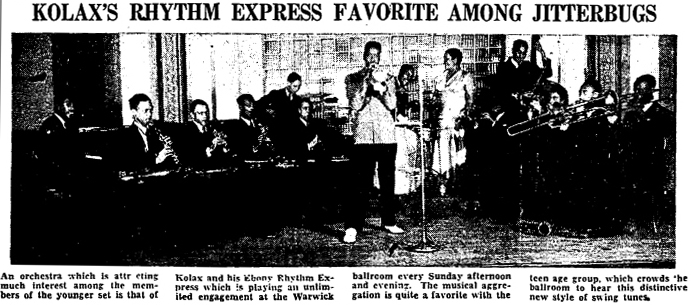
In 1938 and 1939, the band sported some colorful titles, including the Jazz Madmaniacs. On June 18, 1938, the Defender first advertised Kolax et al. at the 65 Club, an establishment with a revue format that was located at 5507 South Michigan Avenue. Jack Ellis's column, "The Orchestras," reported on June 25 that "King Kolax and his Rhythm Makers are now at the 65 Club," and that the members were Fred Brown (sax), Swing Wally (piano), Jap Allen (bass), Hillard Brown (drums), and Kolax (trumpet). The band evolved somewhat, as Kolax continued to work the 65 Club steadily through the rest of 1938 and all of 1939. According to Otto Flückiger's research, the 65 Club band included Goon Gardner (as), Charles Stewart (as, ts), Lamar Collins and Richard Overton (saxes); Albert ... and Wiley Rodgers (p); Jap Allen or John Simmons (b), replaced in August 1939 by William Kelly (b); and Kansas Fields (replaced in August 1939 by Joe Marshall) or Hillard Brown (d); plus vocalist Yvonne Smith.
Otto Flückiger's notes include a reference to a Kolax band at the Savoy in Chicago, March 1939, which briefly included Russell Williams (tp), Charlie Parker [yes, that Charlie Parker] and Richard Overton (as), Charlie Stewart (ts), and Yvonne Smith (voc). The month is clearly wrong, however; there are no Savoy ads at all in the Defender for March 1939. And Bird Lives! by Ross Russell has Bird arriving in Chicago around August of 1939. Ads began appearing in the September 16, 1939, issue of the Defender for King Kolax and His Rhythmmakers behind the Clarence Weems All Star Revue at the 65 Club.
In an interview with Charles Walton, Kolax recalled that Charlie Parker "had pawned his horn and had hoboed to Chicago from Kansas City. He said he came to join my band. Goon Gardner, considered the baddest Alto Sax player in Chicago, offered the use of his horn. Bird got up on the stand and played and upset the place. The owner hired him and besides working the 65 Club he also played with my big band at the Warwick Hall on Sunday and Friday afternoon." Bird Lives! by Ross Russell quotes an eyewitness account of Bird's arrival (by Billy Eckstine) that corroborates this story (Bird, looking as though he'd been riding the rods, arrived and asked to sit in during a breakfast dance at the 65 Club). After a few weeks, however, Bird pawned Goon Gardner's clarinet and split to New York City.
A "Swing Battle" between King Kolax and His Swingsters and Floyd Campbell and His Syncopators was the featured attraction at the Chicago Tavern Owners Association Annual Benefit Ball, at the 8th Regiment Armory, 35th and Giles, on November 10, 1939.
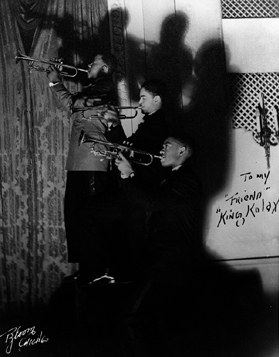
In Jazz Information for December 15, 1939, Donel O'Brien reports that "Bill Kolax, very fine trumpet player, and his marvelous little combination are out of the Club 65." A band led by bassist John Leedy had taken over (Hillard Brown remained on drums from the Kolax band). In the January 5, 1940, O'Brien enlarged somewhat on his treatment of Kolax: "Everyone wonders who King Kolax is. He is a trumpet player of the top bracket, in my estimation, who has had some of the worst breaks. His style is an excellent blending of Roy Eldridge, Cootie Williams, and Rex Stewart. He has surrounded himself with some of the best musicians in Local 208 (Chicago's colored musicians' union). Kolax had a five-piece combination in the Club 65 (which he left over a dispute with the management); but his pride and joy was his big band. After working until four or five in the morning at the '65,' he'd run home to make another arrangement for his big orchestra. This band stuck together through thick and thin, mostly the latest report is that it's doing well in St. Louis. I hope so..." (For these and other issues of Jazz Information see http://home.att.net/~joeshepherd/main.html.)
During 1940, King Kolax worked a number of Sunday dances at the Savoy Ballroom (47th and South Parkway). Donel O'Brien reported (in Jazz Information for January 26, 1940) that "King Kolax played at the Savoy with his band. The union drew out four men, causing the band to sound muddy; Kolax himself did nothing but bang out high Bbs all night long. The band was not up to par, and much rehearsing was obviously lacking, but Kolax himself seemed to think it was all right..." Presumably the band improved with experience. Advertisements in the Defender put them at the Savoy on February 11, April 14, June 23, and July 7 of that year. According to Kurt Mohr's files, the personnel in March 1940 was Louis "Bill" Ogletree, Paul King, Alfred Lewis (tp); William Taylor, Alphonse Fook, Gerald Valentine (tb); Richard Overton, Andrew "Goon" Gardner (as); Albert Atkinson, Charles Stewart (ts); Wiley Rodgers (p); William Harper (g); Dallas Bartley (b); and Jack Parker (d). On November 10, 1940, King K's appearance at the Savoy was billed as "The King Returns." On November 17, King Kolax shared a bill with Charlie Barnet's big band. On November 24, his billing at the Savoy heralded his band as "recently returned from Harlem where he scored an impressive triumph at New York's Golden Gate and Savoy Ballrooms." King Kolax also played the Savoy on Sunday December 8, 1940.
During 1941, King Kolax continued to play the Sunday dances at the Savoy Ballroom pretty regularly, with an apparently stable personnel. On Sunday January 12, 1941, his band shared the bill with Glen Gray and the Casa Loma Orchestra. It appears the band then went on its second tour of Mississippi, Alabama, Tennessee, Virginia, and North Carolina, played the Savoy Ballroom in New York City again, and was on its way back to Chicago when it landed in Indianapolis for 10 nights at the Sunset Terrace (April 25-May 4, 1941). According to a mildly extravagant article in the Indianapolis Recorder about the band's recent tour and upcoming Naptown engagement ("King Kolax and his Orchestra at Sunset Fri., Sat., Sun.: Comes Direct from Congress Hotel and Savoy in Chicago," April 26, 1941, p. 12), Kolax was leading a fifteen-piece band including Jesse Miller (tp); Hobart Dotson (tp); Russell Wilson (tp); Bennie Green (tb); Alphonso Fook (tb); Andrew "Goon" Gardner (as); Albert Atkinson, Charles Stewart (ts); Thomas Crump (saxes); Wiley Rodgers (p); Dave Reed (g); Dallas Bartley (b); and Jack Parker (d). Yvonne Smith was the female vocalist. Bill Ogletree and Paul King had left the trumpet section, Bennie Green had replaced William Taylor or Gerald Valentine among the trombones, Thomas Crump had replaced Richard Overton among the saxes, and Dave Reed had taken over on guitar.
On May 11, the Savoy featured King Kolax "and his enlarged orchestra—Home again—first dance date." The Defender for May 31, 1941, ran an advertisement for King Kolax at the Grand Terrace Ballroom, with vocalist Gladys Palmer. In June 1941, Johnny Griffin remembers a private event featuring the Kolax band with Gene Ammons (then just 16 years old) as the tenor saxophone soloist. On August 3, 1941, King Kolax and His Orchestra were featured at "A Night in Havana Summer Fiesta Dance" at the Savoy (admission 30 cents, plus tax). On Sunday, November 2nd they were playing "their last Chicago dance engagement before starting on a nation-wide dance and theatre road tour." (This was probably their third such tour.) King Kolax and his Rhythm Rocking Band were back at the Savoy for a Christmas Dance along with Nat Towles and his Sensational Men of Music on Thursday, December 25, 1941.Kolax's band at the Grand Terrace in 1942 retained most of the personnel from the April 1941 engagement at the Sunset Terrace. Russell Wilson was back in the trumpet section, and Richard Overton was again playing alto sax. Dave Young had replaced Albert Atkinson on tenor sax, while Billy Brown was added on baritone sax (Kolax had probably not used the bari regularly before this time). This is probably the band that trumpeter Raymond Orr had in mind when he told the late Charles Walton that "Benny [Green] had been in a band that King Kolax formed with kids from DuSable and took them on the road where, he said, they lived on baloney sandwiches" (see the late Charles Walton's Bronzeville Conversations on the Jazz Institute of Chicago website). On February 5, 1942, the Board of Musicians Union Local 208 heard a dispute involving a debt King Kolax had incurred to buy instruments for his band—some of the members had not yet paid him back. King K and Russell Wilson had to appear before the board; Hobart Dotson and Richard Overton were both mentioned.
On February 8, 1942, King Kolax and his Orchestra participated in a battle of the bands at the Savoy Ballroom; Jay McShann and his Decca Recording Orchestra topped the bill. According to Kurt Mohr, during his Savoy engagements in 1942, Kolax expanded his band to four altos (Goon Gardner, Richard Overton, James Scales, and an unknown) and four tenors (Dave Young, Charles Stewart, Gene Ammons, and Lankford Keyes)! On March 19th, King Kolax and his Orchestra played the Grand Opening dance at the White City Ballroom (63rd and South Parkway; they had already been booked at the venue in 1940 or 1941). Another benefit dance at the Bingo Arcade (36th and State) took place on April 19. King Kolax and His New Orchestra were back at the Savoy on June 14, 25 (a graduation dance with John Kirby and Count Basie), and 28 as well as July 5, 1942. (Defender ads are the source for these dates.) For the June 28 and July 5 appearances the aggregation was billed as "King Kolax and His New Orchestra." After this run at the Savoy, King Kolax seems to have disbanded his outfit and joined the Ernie Fields Orchestra, which toured the Midwest. He may have been in the Fields aggregration when it played the Savoy on September 13; Helen Humes was the featured vocalist.
We should note that in 1940-1942, the Savoy Ballroom was regularly hosting the top bands on the national scene. In 1940, Andy Kirk, Earl Hines, Erskine Hawkins, Coleman Hawkins, and Lucky Millinder played the Savoy; in 1941, Count Basie, Lionel Hampton, Louis Armstrong, Cab Calloway, Ella Fitzgerald, and Artie Shaw all put in appearances; in 1942, Jay McShann, Cootie Williams, John Kirby, Louis Jordan, and Jimmy Lunceford worked the room. Local Chicago performers sometimes appeared (such as harmonica player Rhythm Willie and Red Saunders in 1940, or Dyett's Du-Sable-Ites in 1942) but none were invited back with nearly the frequency that King Kolax was. According to the Indianapolis Recorder story from April 1941, Kolax's ensemble had won official recognition as the Savoy's house band. It looks like sheer bad luck that King K's big band failed to land a recording contract.
In the early 1940s (our guess is 1942), the King Kolax Orchestra was reportedly the first Black band to play on an NBC radio broadcast. We first hear of him calling one of his bands the NBC Orchestra in October 1942. (Years later, Kolax would sometimes refer to his 1954-1957 combo as the NBC Quintet.)
In the fall of 1942, King Kolax was once again touring the Midwest with his own band. A notice in the Sandusky, Ohio, Register Star News for October 31, 1942 puts King Kolax and his N. B. C. Orchestra (in the first surviving mention of that name) in a revue called "Vampin' Babies" at the Seitz State Theater.
King Kolax put together a new band and went on the road with it during the first half of 1943. Paul King wasn't playing or touring with the band any more, but he was writing arrangements for it. On April 15, 1943, the Board meeting minutes of Musicians Local 208 state that
The Board considered the claim of member Paul King, filed against member William (King Kolax) Little, for $50.00, representing payment for seven arrangements. King Kolax is currently playing a traveling engagement in the jurisdiction of Local 5 (Detroit, Michigan).
On motion, the Board ruled that member Little shall be notified through Local 5, to show cause why the claim should not be allowed. (p. 1)
On May 20, 1943, King appeared before the Board. He claimed that he gave the scores of 7 arrangements "to Kolax to be copied and returned. The scores were as follows: LADY BE GOOD, BLUE SKIES, ORIGINAL TUNE, AVALON, STAR DUST, BLESSED EVENT" (Board Meeting minutes, p. 1). Maybe there were two original tunes involved, since there were 7 scores? Kolax, still on the road, claimed in a letter that he had returned the scores to King; King denied getting them back. So the Board allowed King's claim. We assume Kolax paid. Otherwise he would have been "erased" from the membership rolls.
From late May through the end of the year, Kolax was just about constantly on the road with his band. On May 21, he was doing a one-nighter "direct from Chicago" at the Old Madrid in Corpus Christi, Texas, in a show featuring the comedy duo of Butterbeans and Susie. An item in the Chicago Defender from September 4, 1943 has King Kolax playing at the Dragon Ballroom in Mobile, Alabama: "After a string of one-nighters, Kolax and the boys will head East to send the folks on the East Coast with their orginal Kolax swing." However, they had not gotten much farther north by September 25, when a news item in the Defender had King Kolax in Savannah, Georgia, leaving "the fans in the city 'screaming for more.'" The October 2 issue ran an item datelined New York City and headlined "King Kolax Invades East." "King Kolax, his golden trumpet and his NBC orchestra will invade the east with that powerful sizzling swing that made the name Kolax famous throughout the Mid-west and South." Maybe they did get to the Apple, but if so they didn't stay long.
On October 30, 1943, the Defender ran an item datelined Chattanooga, Tennessee: "King Kolax, wizard of the trumpet, and his mighty orchestra are enjoying one of the best seasons of their career. The band has been playing a southern tour for the last three months and from all reports are doing capacy 'BIZ.' They played to standing room only at the Lincoln Inn, Savannah Georgia." King Kolax returned to the Savoy in Chicago for a dance on Sunday, December 5, 1943. The "News of Western Bands" column in the December 1943-January 1944 issue of the Music Dial stated that
King Kolax and his mighty band are booked to appear at Indiana's home of happy feet, the Sunset terrace, Indianapolis, Indiana, opening Friday, December 24 [1943], for ten days. Kolax will feature with his band a floor show headed by such stars as Barron & Nona and Bob Freeman's Revue. At the conclusion of the Terrace run, the band is slated to do a series of theatre tours in the East and Midwest. (p. 17)
The dateline to this announcement gave Louisville, Kentucky, as the location. We are thankful to Chris DeVito for turning up this and subsequent items from the Music Dial.
In his 1943 bands, Kolax used at various times Gardner, Overton, James Scales, and Roy Grant (as), and Dave Young, Charles Stewart, Lankford Keyes, and Gene Ammons (ts). Bob Porter says that Gene Ammons left Kolax directly to go with the first Billy Eckstine band in April 1944.
King Kolax was not advertised at the Savoy in 1944—the ballroom was running into financial problems by this time. The Kurt Mohr files list the following personnel for an enagement at the 666 Club in Detroit, in 1943 or 1944. The band had slimmed down a little: Kolax, Paul Johnson, Elisha Hanna (trumpets); James Scales and Roy Grant (alto sax); Gene Ammons and Lankford Keyes (tenor sax); Clarence Anderson (piano); Ernest Luckett (guitar); Dad Washington (bass); Buford Oliver Pugh (drums); Yvonne Smith (vocal). (Hanna would visit Chicago in 1945 and 1946, as a member of Fletcher Henderson's band.)
Kolax continued to lead touring big bands throughout 1944. On January 1, he was finishing up at the the Sunset Terrace in Indianapolis with floor show. The next item to mention his movements, in the February 1944 Music Dial, has his band following their "very successful" engagement in Naptown with a "short series of one nighters through Ohio." They were on their way farther south: "Their Florida engagements are to open around the 17th of January where they are booked to appear at the well known Two Spot Club, Jacksonville, Florida for a limited engagement" (p. 20). The same "News of Western Bands" indicated that the King K band had been selected to entertain the troops at the Tuskegee Army Air Base, to which the entire band was to be transported by plane. The March 1944 issue of the Music Dial confirmed that the band had wrapped up its engagement at the Two Spot Club (with a return engagement for Easter week) and that "the modern Gabriel and his great band [were] headed east playing St. Louis and Indianapolis on their way into New York" (p. 16). Kolax was being booked by Ferguson Brothers out of Indianapolis, who announced that they were starting a New York office and booking King K's band into the Westchester County Center "in March" (Horace Carter, "Concept of a Rumor," Music Dial, March 1944, p. 18).
The Ferguson brothers were supposedly also starting a record label, but nothing came of that project. Had they carried through on it, we would have more than one session by King K's big band.
On March 4, a story in the Defender had Kolax temporarily in Chicago working a March 5 dance at the Parkway Ballroom under the sponsorship of McKie Fitzhugh's Beau Brummells organization, to honor Miss High School Grad of 1944.
They were quickly back on the road. On March 11, Kolax and band were booked into Castle Farm in Hamilton, Ohio. On April 25, 1944, King Kolax and his NBC Orchestra were once playing City Auditorium in Galveston, Texas. A May 6, 1944 item on King Kolax was datelined New Orleans: "King Kolax, new king of the trumpet, brought his 17-piece band to Camp Plauche, Sunday, to headline Pvt. Bill Donaldson's weekly Swing Parade. Before a packed theatre audience which included such celebrities as Teddy Hill, former orchestra leader, Louis Messina, local dance and fight promoter, Ernest Thomas, president Crusaders club and, and John Hammond, international music critic, Kolax proved his right to the crown that was placed on his head by the Camp's Pin-up Girl, Miss Dorothy Lamb. John Hammond, now stationed at Camp Plauche in special service, was loud in praise of the King."
Later in the year, the Kolax band had a long stay in Detroit. On October 17, the ban was back in Galveston, Texas "by popular demand." Kolax kept working in visits to military bases whenever he could, as reported by the Defender in a dispatch dated October 28, 1944. The headline read "King Kolax Plays at Missouri Camp" and the dateline was Jefferson Barracks, Mo. "True to his policy of stopping off in at least one army camp during each week, or 'sandwiching' in more than one whenever possible, King Kolax, the 'Trumpet Sensation of the Nation,' paid a visit here Monday night for the entertainment of the enlisted men here. Roughing it like any other solider and not asking for any special favors, King Kolax and his fourteen 'crazy cats' seemed really to enjoy their stay here."
A brief item in the November 1944 Music Dial, datelined Monroe, Louisiana, declared that "With one-night stands at Tallulah, Monroe and Lake Charles, La., King Kolax, “The Mighty King of the Trumpet,” takes his crew into the state of Texas, where his many fans who remember his last appearance there, anxiously await his arrival" (p. 15.) On December 5 and 6, the Kolax band played the Roosevelt Theatre in Pittsburgh, "bringing with him four outstanding acts which thrilled the patrons of that theatre" ("King Kolax Plays Pittsburgh House," Chicago Defender, December 9, 1944, p. 9). By year's end, the band was in Detroit, where, according to "Dial in on Detroit with Wolf Morgan," "King Kolox [sic], now on a nation wide tour with his band, dished out some great music for the Civic Center patrons recently. He's a Detroit boy" (Music Dial, December 1944-January 1945, p. 12).
In January 1945, items in the Chicago Defender and the Chicago Bee have King Kolax and his NBC Orchestra playing Buffalo and Cleveland. According to an item in the Baltimore Afro-American, King K's band closed at the Metro in Cleveland in late January "and will head for Nashville, Tenn., to play Saturday [January 27] and Sunday at Paradise Ballroom" (January 27, 1945, p. 14). On February 21, 1945, the band was once again at City Auditorium in Galveston, Texas. From February to April, he and his big band were covering a lot of territory, from Louisiana to Kansas to Florida; according to the Baltimore Afro-American of March 10, "King Kolax and his torrid orchestra packed the spacious City Auditorium [in Topeka, Kansas] last week despite the early curfew" (p. 16). An item in the Music Dial, obviously placed by King K's agent (it cites a "talent scout for the Ferguson Bros. Agency") makes the defensible assertion that King K is "a 'wizzard [sic] of the trumpet'" and the readily dismissable follow-through that "Kolax is the most sought after band in America" (March-April 1945, p. 10). The piece is on more factual ground when it cites Jessie Keith, a promoter in Monroe, Louisiana, to the effect that King K's engagement there was the third in two years. On June 12, the band was in Uniontown, Pennsylvania, playing the "Colored Senior Prom" at Lafayette Junior High School.
On June 20, 1945, the Kolax band was back in Chicago, playing the Peds and Bengals party at the Pershing Ballroom. On August 4, 1945, an item datelined in Bradenton, Florida had "King Kolax and his Powerhouse band of a Thousand Riffs... breaking it up" on their latest tour of that state (Baltimore Afro-American, p. 18). We lack documentation of the band's gigs for the rest of the year, but it's a fair inference that Kolax kept touring during the remainder of 1945 while economic conditions were deteriorating.
According to Kurt Mohr's files, Kolax's 1946 band toured the South including Texas. By now the financial realities must have been pretty dire; big bands were shutting down in droves. On February 1, the band played a dance in Maxton, North Carolina. A later series of gigs in the South has come to light: March 20, 1946, in Charleston, South Carolina; March 24 in New Orleans; March 25 in old reliable Monroe, Louisiana; March 28, 1946, in Pensacola; March 31 in Orlando; April 1 in Tampa; and April 2 in West Palm Beach. The March 20 through 28 listing ran in "Where the Bands Are Now Playing," Baltimore Afro-American, March 23, 1946 (p. 21); the March 28 through April 2 appeared "Where the Bands Are Playing," Los Angeles Sentinel, March 28, 1946, p. 11, under the same title in the Cleveland Call and Post, March 30, 1946, p. 6-B, and under "Band Routes" in the Baltimore Afro-American, March 30, 1946, p. 21. (Our thanks to Chris DeVito for these references. The gigs from March 28 through April 2 are mentioned in Lewis Porter's book on John Coltrane, but there they are incorrectly dated 1947. For more on the 1947 edition of the band, see below, after the two Billy Eckstine sessions.)
King Kolax's big band broke up in May or June 1946. Its former leader put off being downsized by joining Billy Eckstine's last big band.
Despite 10 years of constant musical activity, most of it leading his own bands, Kolax didn't make it onto a single recording until his stint with Eckstine. This must have been a considerable source of frustration: King K's was never one of the top Swing bands (Vernel Fournier referred to it as a "B" band or a "C" band), but, like Milt Larkin's never-recorded organization (see our Tom Archia page), it was surely better than many that did appear on record.
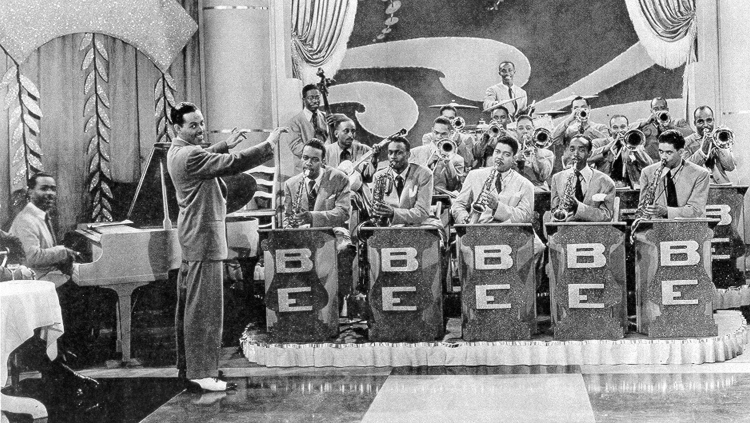
Billy Eckstine (voc, v-tb, ldr); Hobart Dotson (tp); King Kolax (tp); Leonard Hawkins (tp); poss. Rostelle Reese (tp); Alfred "Chips" Outcalt (tb); Gerald Valentine (tb); Howard Scott (tb); unidentified (tb); Porter Kilbert (as); poss. Robert "Junior" Williams (as); Gene Ammons (ts); Frank Wess (ts); Leo Parker (bars); "Stick Carrier" (p); Connie Wainwright (g); Bill McMahon (b); Art Blakey (d); Ann Baker (voc).
Film soundtrack, NYC, June or July 1946
| Second Balcony Jump (rehearsal) | Harlequin HQ2068, Vintage Jazz Classics Video VJC-2006 | ||
| Rhythm in a Riff [BE voc] | Harlequin HQ2068, Vintage Jazz Classics Video VJC-2006, Video Storyville SV-6051 | ||
| You Call It Madness [BE voc] | Harlequin HQ2068, Vintage Jazz Classics Video VJC-2006, Video Storyville SV-6051 | ||
| Second Balcony Jump (complete version) | Harlequin HQ2068, Vintage Jazz Classics Video VJC-2006 | ||
| Lonesome Lover Blues [? voc] | Harlequin HQ2068, Vintage Jazz Classics Video VJC-2006, Video Storyville SV-6051 | ||
| Taps Miller | Harlequin HQ2068, Vintage Jazz Classics Video VJC-2006, Video Storyville SV-6051 | ||
| I Cried for You [AB voc] | Harlequin HQ2068, Vintage Jazz Classics Video VJC-2006, Video Storyville SV-6051 | ||
| I Want to Talk about You [BE voc] | Harlequin HQ2068, Vintage Jazz Classics Video VJC-2006, Video Storyville SV-6051 | ||
| Our Delight | Harlequin HQ2068, Vintage Jazz Classics Video VJC-2006, Video Storyville SV-6051 | ||
| Prisoner of Love [BE voc] | Harlequin HQ2068, Vintage Jazz Classics Video VJC-2006, Video Storyville SV-6051 |
Our information is drawn from Lord's Jazz Discography and Michael Fitzgerald's Hobart Dotson discography. The baritonist is not identified in Lord but Leo Parker can be seen in the film. Frank Wess told Mario Schneeberger that, although Jimmy Golden was supposed to play piano in the film, he got drunk and had to be replaced by Louis Dunlop. The video releases identify Jimmy Golden as the pianist; Lord has Linton Garner or Jimmy Golden. Meanwhile, Linton Garner identified the pianist by his nickname, "Stick Carrier." According to an interviewer who asked Linton Garner to identify the musicians in the film:
As for the pianist in the photo without the girls, Linton finally remembered that he was known as "Stick Carrier." It was a nickname, he explained to me, which would be known to Blacks, and it's used for a guy who is always running out of money at a crucial time, or who forgot to pick up his suit at the cleaners before a gig, or who had perhaps spent all his money on marijuana and suddenly had nothing for dinner, etc. Linton said that when he joined Eckstine's band he took "Stick Carrier's" place.
Garner confirmed the identities of the most of the other musicians, except the baritone player, who wasn't in the band when he joined. Our thanks to Mark Cantor for this interview excerpt.
Harlequin HQ2068 was a British LP. The film was reissued on video in 1993 along with some footage of Dizzy Gillespie, under the title Dizzy Gillespie/Billy Eckstine: Things To Come (Vintage Jazz Classics Video VJC-2006). There is also a release on Video Storyville SV-6051; this one lacks the two takes of "Second Balcony Jump." Thanks to Mario Schneeberger for information about the Video Storyville release.
Gene Ammons gets two solos, and Hobart Dotson and King Kolax get one brief solo apiece.
Billy Eckstine (voc, v-tb, ldr); Miles Davis (tp); Hobart Dotson (tp); Leonard Hawkins (tp); King Kolax (tp); Walter Knox (tb); Chips Outcalt (tb); Jerry Valentine (tb); Sonny Stitt (as); John Cobbs (as); Gene Ammons (ts); Arthur Simmons (ts); Cecil Payne (bars); Linton Garner (p); Connie Wainwright (g); Tommy Potter (b); Art Blakey (d).
Los Angeles, October 5, 1946
| N164 | Oo Bop Sh'Bam [BE, ens voc] | National 9125, EmArcy MG36038, Mercury [J] BT 2015, Savoy SJL 2214, Denon/Savoy SV-# [CD], Musical Heritage Society 515455K [CD] | |
| N164-alt. | OoBop Sh'Bam [BE, ens voc] | Regent MG6053, CBS/Sony [J] SOPL 54-SY, Savoy SJL 2214, Denon/Savoy SV-# [CD], Musical Heritage Society 515455K [CD] | |
| N165 | I Love the Loveliness of You [BE voc] | National 9030, Rendition EP109, EmArcy EP1-6010, EmArcy MG26027, EmArcy MG36030, Mercury [Fr] MEP14029, Savoy SJL1127 | |
| N166 | In the Still of the Night [BE voc] | National 9037, Rendition EP109, Regent MG 6054, EmArcy EP1-6010, EmArcy MG26027, EmArcy MG36030, Savoy SJL2214, Denon/Savoy SV-# [CD], Musical Heritage Society 515455K [CD] | |
| N167 | Jelly Jelly [BE voc] | National 9021, Rendition EP109, EmArcy EP1-6040, EmArcy MG26025, EmArcy MG26029, Vogue/Mode [Fr] MDINT9201 | |
| N167-alt. | Jelly Jelly [BE voc] | Regent MG6053, Savoy SJL2214, CBS/Sony [J] SOPL54-SY, Denon/Savoy SV-# [CD], Musical Heritage Society 515455K [CD] |
Our session and issue information are based on Tom Lord's Jazz Discography. These sides all appeared originally on National 78s. All have been reissued many times. Savoy SJL2214 was a 2-LP set released around 1980. Denon/Savoy SV-# was a Japanese CD reissue that did not include the complete contents of the old 2-LP set but carried forward a mutilated version of the liner notes and the cover art. Musical Heritage Society 515455K iss a CD titled Mr. B. and the Band (The Savoy Sessions 1945-1946) and issued in 1999; it is a straight reissue of the Denon/Savoy CD (so it misleadingly includes the distorted liner notes that refer to the complete contents of the old Savoy 2-LP set).
The alternate take of "OoBop Sh'Bam" sounds identical to the originally issued take except during Gene Ammons' tenor sax solo. We suspect that when the Regent LP was being prepared in the late 1950s Jug's solo was spliced in from an otherwise rejected version.
King Kolax does not solo on any of the items that we have heard ("I Love the Loveliness of You" still needs checking).
Standard discographies, including Tom Lord's, put the same band plus a string section on a session that Billy Eckstine cut for National the very next day, October 6, 1946. The items recorded were "My Silent Love" (N168), "Time on My Hands" (N169), "All the Things You Are" (N170), and "In a Sentimental Mood" (N171). However, Ira Gitler in the liner notes to Savoy SJL 2214 indicated that Eckstine was accompanied by an unknown studio orchestra with strings. A listen to these sides confirms this judgment; no way are these Hollywood horn players Eckstine's regulars. Eckstine told Gitler that the straight trumpet statement on "Time on My Hands" was done by Ray Linn, who was active on the West Coast in the 1940s, and appeared on another Eckstine session in 1947.
After the Eckstine band succumbed in its turn to postwar downsizing, Kolax had one last fling at big band leadership. On November 23, 1946, the Baltimore Afro-American announced that "King Kolax, trumpeter, has left the Billy Eckstine orchestra to reorganize his own outfit" (p. 19). Indianapolis was given as the location, which means that the source was a press release from King K's agent. John Coltrane (not yet a tenor player) was a member of this final big band, from around January to May 1947. According to Kurt Mohr's files, the lineup was: King K, Frank Keyes, Alonzo Alfred, Herb Williams (trumpets); Benny Powell, George Crigler (trombones); John Coltrane, Elmer Williams (alto sax); Joe Houston, Lynn Hope (tenor sax); Lonnie Shaw (baritone sax); Vern Johnson (piano); Ernest Luckett (guitar); Jimmy Weathersby (bass); Rudy Pitts (drums); and Danny Knight (vocal).
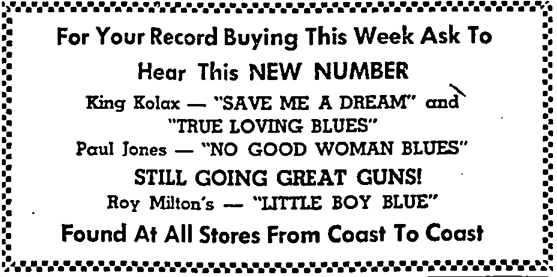
Trane once said that the Kolax band recorded a piece of his titled "True Blues" (our thanks to Lewis Porter for this information). It was supposedly done for a small label in Los Angeles. According to the reminiscences of singer Earl Coleman, as quoted in Ira Gitler's Swing to Bop, this would have happened in February 1947, when Trane jammed with Charlie Parker—and Danny Knight sang with him. As yet, however, the early 1947 band's gigs have not been documented from any contemporary source.
But we know the band recorded in Los Angeles, for the Miltone operation. An advertisement in the Los Angeles Sentinel (March 27, 1947, p. 20) oddly never mentions the name of the label or the distributor, but touts a King Kolax release along with two known releases on Miltone.
For several years the only other information we had was a low-resolution label shot of a 78 on the Miltone epigone Ace, which can be seen on the Miltone picture label site at http://koti.mbnet.fi/flidi/milton/. Specifically, this was the label to "True Loving Blues." We can finally show this same label in high resolution. (For the label to the other side, see below.)
More recently high quality scans, of both sides of a second release from the same session, have turned up, also at http://koti.mbnet.fi/flidi/milton/. It was from these that we first learned that the band was billed as King Kolax His Trumpet and His 17 Knights.
In the spring of 1947, singer and bandleader Roy Milton had fallen out with War Perkins and William O. Reed, the owners of the California Pressing Company and Day Distributing Company, and his partners in what was first called Roy Milton Records, name later changed to Miltone. Perkins and Reed filed suit against Roy Milton, in an effort to prevent him from recording for Specialty when (they claimed) he was still under a 5-year contract to their company. A long newspaper story about the suit, "Milton Waxing Mix-Up Goes to Calif. Court" (Pittsburgh Courier, April 26, 1947, p. 17) includes King Kolax among the artists under contract to Miltone.
Although both singles carried the cartoon label art for which many Miltones are celebrated, we only have confirmation of two very limited-circulation releases on the Ace subsidiary. A copy of the first release, now in the collection of Robert L. Campbell, has label copy on one side only; the other side carries a blank label, forcing us to conjecture what the title was.
Stamped in the trailoff shellac on the two sides of the first single are KOLAX-2 and KOLAX-4, which gives us a pretty good idea of the other two matrix numbers.
King Kolax (tp, ldr); Frank Keyes (tp); Alonzo Alfred (tp); Herb Williams (tp); Benny Powell (tb); George Crigler (tb); John Coltrane (as); Elmer Williams (as); Joe Houston (ts); Lynn Hope (ts); Lonnie Shaw (bars); Vern Johnson (p); Ernest Luckett (voc -1, g); Jimmy Weathersby (b); Rudy Pitts (d); Danny Knight (voc -2).
Los Angeles, c. February 1947
| KOLAX-1 | D' Ja Eat Yet (Kolax)* -1 | Ace Kolax 1-A | |
| KOLAX-2 | True Loving Blues (Coltrane-Knight)^ -2 | Miltone 204 [?], Ace Kolax B-1 | |
| KOLAX-3 | Save Me a Dream^ -2 | Ace Kolax 3-A | |
| KOLAX-4 | My San Antonio Woman* -1 | Miltone 204 [?], Ace Kolax A-2 [?] |
The newspaper advertisement of March 27, 1947 gives one title from each record, not two sides of a single release. "True Loving Blues" had a vocal by Danny Knight. We have heard the coupling now, but don't know what the intended title was, for lack of label copy. "Save Me a Dream" turns out to be from a different record. However, the advert mentions "Little Boy Blue" by Roy Milton (Miltone 201) and "No Good Woman Blues" by Paul Jones (Miltone 206). And Miltone 205 was another Paul Jones release. Which leaves a tempting gap in the release series, right at Miltone 204.
The first Ace release carries no actual release number, just Kolax B-1 on one side, and an unknown indication on the other ("logically," it might have been Kolax A-2).
The second Ace release carries Kolax 1-A on the label to one side and Kolax 3-A on the other. The label copy confirms the size of the band and the presence of Ernest Luckett and Danny Knight.
With the confirmations of Knight and Luckett from Ace labels, we have employed Kurt Mohr's personnel for the band. Except Mohr listed 16 musicians. Was a third trombonist the 17th Knight?
On "True Loving Blues" we may now report that Danny Knight sings a rather routine blues number (he was better at crooning than shouting), with fairly prominent guitar work by Ernest Luckett and some solo work by the leader. There are no other instrumental solos, by John Coltrane or anyone else. "My San Antonio Woman" (a phrase that Ernest Luckett sings, though we don't know whether it was meant to be the title) has some better blues singing, and again some noticeable guitar work. The tune concludes with a boppish trumpet solo by King K.
Vernel Fournier, who left college at Alabama State to join it, was the last drummer in King Kolax's last big band; he replaced Rudy Pitts, whom he got to observe for nearly two weeks while Pitts played out his notice. While Fournier was in it, the band ranged as far north as Indianapolis and as far south as Texas. Fournier joined the band in Savannah, Georgia; he recalled that the band was stranded for 2 days or so in New Bern, North Carolina. The big band was finished when the musicians were stranded in Tulsa, though Kolax limped on a bit longer with a combo, first in Tulsa and then for a time in Oklahoma City.
After the final collapse of his big band, Kolax seems to have gone back to Chicago, then hit the road again with a small combo. In Setpember, the Ferguson brothers picked up his combo for a package show. Courtesy of Raymond Astbury, we have found two notices for a King Kolax concert at the Municipal Auditorium in Moberly, Missouri, a place Kolax knew well because of his appearances at the nearby Army base during the war. This took place on October 13, 1947, which means "the King and his jungle swing band" were not a large group. The October 13 notice declares that they were using "a new kind of rhythm called 'shuffle rhythm.'"
For a time in 1948 (exact months not known) Kolax worked in a band led by blues singer and drummer Sonny Parker at the Cotton Club in Cincinnati. The lineup, as recalled by Sonny Parker, was King Kolax and Jesse Perry (trumpets); Archie Washington (alto sax); Paul Renfro (tenor sax); Pick Gordon (piano); Monty Morrison (bass). Renfro, Gordon, and Morrison appear to have accompanied Parker on a Columbia session that was cut in Los Angeles in December 1948. But, contrary to what Parker told interviewers during his lifetime, the rest of this band was not present on the recording date, and Kolax had been gone for several months by then (see Appendix B for this session). King Kolax's next record was made under his own name in Chicago. Like his first two, it is insanely rare today.
King Kolax (voc; tp -1); Johnny Thompson (ts); Willie Jones (p); unidentified (b); unidentified (d).
Chicago, before October 1948
| OP5 | Back Door Blues -1 | Opera 6 | |
| OP6 | Straight Woman Blues | Opera 6 |
Thanks to collector Robert Javors for information on the very rare Opera 6, a 78 released in 1948. We do not know the exact release date, but the single appeared before—perhaps just before—Joe Brown shut down his Opera label in mid-October 1948 and sold off several of the masters. This single was previously known to have been issued, but no details could be found in the published sources. Thanks to a dub provided by Javors, we can identify the instrumental lineup now. The tenor saxophonist is prominent on both sides (including solos). Vernel Fournier said that he sounded a bit like Joe Houston (the tenor soloist in Kolax's last big band) but believed that the tenorist was Johnny Thompson. The pianist, who is featured on "Straight Woman Blues," is a heavy blues player (also given to muttering during his solos); on hearing a dub, Vernel Fournier immediately identified him as Willie Jones. Judging from these sides, King K could have made it as a stand-up R&B singer...
Vernel Fournier reported that he first came to Chicago in October 1948 when King Kolax invited him to join his combo; bassist "Whiskey" Sheffield accompanied Fournier on the trip. Fournier's role in the Kolax combo was documented in January 1949, along with Johnny Thompson and Sleepy Anderson, but he did not recall recording with Kolax, and stated, after listening to a tape, that he was not at the drums on this session. What we know about the brief life of the Opera label confirms that this 78 was recorded before Fournier arrived in town.
A Chicago Defender item from October 16, 1948 says: "King Kolax we note is back in town playing a limited engagement at a small 43rd St. lounge. Kolax has been touring the East."
We formerly listed a session by Sonny Parker and his Orchestra in this discography, but we know now that King Kolax had a steady gig in Chicago when the session was cut (in December 1948) in Los Angeles. We have moved this rather confusing session to Appendix B—wherein we attempt to explain why anyone thought King K was on a session where no trumpet can be heard.
Fournier himself left Kolax to toward the end of 1949 to work the Macomba Lounge with Tom Archia. After Johnny Thompson left, Lynn Hope, an alumnus of the early 1947 band, played tenor sax with Kolax for about a year (this affiliation ended in early 1950 when Lynn Hope started making his own records for Premium with a family band). A December 31, 1949 Defender ad for the Ritz Theater Bar lists the "King Kolax Ritz Band." Kolax's house band was backing Valda Gray's revue of female impersonators at the time. King K's renewal contract with the Ritz was posted with Musicians Union Local 208 on January 5, 1950.
On June 25, 1950, King Kolax was one of the players in the "Session in Progress: Ragtime & Swing" concert at the Beige Room, with Eugene Wright, Joe Williams, Floyd Campbell, George Freeman, and the Dozier Boys. On July 29, 1950, Kolax was headlining at Joe's Rendezvous Lounge, along with Grant "Mr. Blues" Jones (who later became a regular collaborator) and Tommy "Mad Man" Jones; they were backed by the Archie Crawford Combo (Crawford filed a contract with Local 208 on July 20).
On September 16 of that year, Joe's featured King Kolax, singer Harold Burrage, and Claude McLin (Kolax posted a two-week contract with Local 208 on September 21). On October 21, King Kolax's combo was on of the attractions at a breakfast dance. As preserved in Galen Gart's First Pressings volume for 1950, the announcement reads: "Madison Roller Rink, 2560 W. Madison St., will be the scene of an All-Star Breakfast Dance on Saturday nite, ([October] 21) from 12 midnite 'til 4 a.m.. Sponsored by Jeep Evans and Rudy Mauran, the dance will feature some of the top names in the business, including Tom Archia, Johnny Griffin, Von Freeman, King Kolax and his combo, Melvin Scott, George Freeman and Grant (Mr. Blues) Jones." A week or two later, Kolax got an opportunity to bring a band into the Regal Theater for a week (contract accepted and filed November 2). But after that his combo ran out of work, and he would be forced to disband.
During the first months of 1951, King Kolax joined a touring band led by blues tenor saxophonist J. T. "Nature Boy" Brown.
For a capsule bio of J. T., see our Parrot pages. As Kolax told it to Jim O'Neal in 1977, "J. T. and I worked together about five or six months. We went to LaSalle, Illinois, Louisville, Montgomery, Alabama. It was Brown, myself, Art Tarry on piano, Hillard Brown on drums and Ernest Ashley on guitar, and he picked up a bass player out of Chattanooga [Tommy Braden] at Harry Brown's place on East 9th Street. J. T. had an act and he could draw a crowd." (See the notes to Delmark DE-714, Windy City Boogie, a CD collection of J. T. Brown's recordings from the 1950s.)
The tour didn't last 5 or 6 months, and it didn't start in August 1951, as the Delmark notes imply. On the strength of his hit record for United, which came out in September 1951, J. T. Brown would enjoy continuous employment as a leader in Chicago during the second half of that year. Since Hillard Brown was on the Board of Local 208 in 1950 and 1951, we can tell when he was out of town—his absences had to be recorded in the minutes. Hillard Brown was at the Board meeting on January 4, 1951; after that he was absent from every meeting until April 5. What's more, neither Kolax nor J. T. Brown nor Ashley nor Hillard Brown posted any contracts as a leader while Brown was absent from the meetings. However, on April 5, when Hillard Brown reappeared at the Board meetings, J. T. Brown posted a 6-week contract with the Hollywood Rendezvous. So our estimate is that the tour ran from January through the end of March 1951. And since Kolax did not file another contract as a leader until November, we figure that he stuck around in J. T. Brown's group. Meanwhile Hillard Brown went his separate way, filing a contract with Club Bagdad on May 17 (two weeks plus option). J. T. filed an indefinite contract with Club Maramba on the West Side on July 19 (his run at the club started around the same date as the recording session). This was followed by an indefinite contract with Club Plantation on September 20.
The revised chronology for J. T. Brown's tour of the South puts King K in his group in July 1951, available to be on hand for United's inaugural session on July 12. Current discographies speculate that one John Oscar might have been on trumpet; we can do better.
J. T. "Nature Boy" Brown (ts, voc); King Kolax (tp); Eurreal "Little Brother" Montgomery (p); Ransom Knowling (b); prob. Armand "Jump" Jackson (d); Roosevelt Sykes (vocal exhortations).
Universal Recording, Chicago, July 12, 1951
| 1009-1 | Rock-em (Brown) | United 106, Pearl PL-9, Delmark DE-714 | |
| 1010-1 | When I Was a Lad (Brown) | United 106, Pearl PL-9, Delmark DE-714 | |
| 1011-1 | Windy City Boogie (Brown) | United 103, Pearl PL-9, Delmark DE-714 | |
| 1012-1 | Blackjack Blues (Brown) | United 103, Pearl PL-9, Delmark DE-714 |
United 103 was a single released in September 1951. According to Leonard Allen, it was the only record in the company's initial release that sold well. United 106 was released later, before the end of the year. Pearl PL-9, J. T. Brown: Windy City Boogie, was an LP released in 1975 or 1976; it collected all of Brown's recordings for United. Delmark DE-714, J. T. Brown: Windy City Boogie is a CD issued in August 1998; it adds sides that Brown made for JOB and Atomic-H as well as a radio jingle.
The personnel is drawn from the Delmark DE-714 notes, except for the trumpet credit (given tentatively there to John Oscar). The Delmark CD credits Roosevelt Sykes (the leader on the first session of the day, and pianist on the second session by Robert Nighthawk) for "encouragement & zest," which he certainly supplies.
Meanwhile, there's been further confusion because discographies have given October 22, 1952 as the date of King K's session for the JOB label, but the immediately preceding matrix numbers (from the same matrix series at Modern Recording Studios) are from a J. B. Lenoir session that the same discographies put on October 22, 1951. Other JOB sessions from 1952 that used Modern Recording Studios have higher matrix numbers. What's more, the Board minutes for Local 208 of the Musicians Union indicate that King K's "indefinite" contract with the Rose Bowl was accepted and filed on October 4, 1951. King Kolax was already using Dick Davis on tenor sax (in fact, Davis filed no contracts as a leader with Local 208 during 1951; he presumably was working for another leader before he joined Kolax). It appears that the combo was an early version of the grouping that we know from various sessions in 1952.
The JOB session features King Kolax as a singer (the second time he had played that role on record). Since JOB was Joe Brown's second effort in the music business, opening in 1949 about a year after Opera collapsed, and Brown was known to favor deep blues, it is not surprising that he asked for more vocal performances out of King K. King K had been leading his new combo for less than a month when he got the call to record for Joe Brown. We are grateful to Brown for his discernment; we only wish he had released more from this session.
The JOB session is the first of Kolax's recordings to feature the underrated tenor saxophonist Dick Davis. Born Richard Earl Davis in Jackson, Mississippi on April 15, 1917, he moved to Chicago with his family in 1924 and graduated from DuSable High School, where he had trained with Capt. Walter Dyett, in 1938. Except for service in World War II (1941-1945) he worked steadily on the Chicago music scene. From June 1946 through January 1947, he recorded twice as a leader for Miracle, and once behind singer Rudy Richardson. But his pianist on the latter two dates, Sonny Thompson, proved more adept at selling records, and Davis's only other appearance on Miracle was as a sideman on a 1949 Sonny Thompson session. Davis would record as a leader at least once more, in mid-1949 for Gotham; his quartet at the time included John Young, piano; Eddie Calhoun, bass; and Buddy Smith, drums. A mysterious release on the Gateway label may have also come from the same session. Davis continued to lead his own group through the end of 1950 (his last contract as a leader was accepted and filed by Local 208 on December 21, 1950; it was for 2 weeks, with option, at the New Club Plantation). When Davis joined Kolax in 1951, he had a firm, dark sound on the tenor sax and a decisiveness in stating his ideas that is more than a little reminiscent of Sonny Rollins.
We believe that veteran pianist Prentice McCarey had also joined the band in time for this session. According to his union card and death certificate (housed at the Chicago Federation of Musicians), McCarey was born in Indiana on November 22, 1909. He is shown as having joined Local 208 on March 5, 1940, but this has to be a renewal, because he was already playing in Freddie Williams' combo in 1934 (see our Hy-Tone pages). By the time he joined Kolax, McCarey had developed a wry harmonic sense and usually sounded like a member of the early bebop generation, instead of a contemporary of Leon Washington and Lester Young.

King Kolax (tp -1, voc); Dick Davis (ts); prob. Prentice McCarey (p); prob. Mentho "Cowboy" Martin (b); prob. Kansas Fields (d).
Modern Recording Studio, Chicago, October 22, 1951
| JB 42345 | Lonesome Man Blues (Little-Brown) [KK voc] | JOB 114 | |
| JB 42346 | Why Didn't You Tell Me So (Brown-Little) [KK voc] -1 | JOB 114 | |
| JB 42347 | Tenderly | unissued | |
| JB 42348 | K. K. Boogie | unissued | |
| JB?, 7005A | She's Funny That Way [KK voc]^ | JOB 7005A | |
| JB?, 7005B | Side Man (Kolax) ^* -1 | JOB 7005B | |
| JB? | Green Monday | unissued | |
| JB? | Early Hours | unissued | |
| JB? | Jelly Beans | unissued | |
| JB? | You Go Your Way | unissued |
Jørgen Jepsen's discography mentions only the first two sides, and gives a date of 1949, which is way too early for this session. The first King K release as JOB 114, but JOB used the number twice: there is also a later JOB 114 by blues guitarist John Lee (Henley)! (Duplicated release numbers were no biggie at JOB; it turns out there were also dueling releases on JOB 101 and JOB 1003.) Lord adds JOB 7005 (titling one side "Why Didn't You Tell Me So?"), and gives the date as late 1951 or early 1952. The complete session is listed by Leadbitter and Slaven, Blues Records 1943 to 1970 A-K(1987).
The original matrix numbers for this session—JB42345 through JB42348—immediately follow a JOB session by J. B. Lenoir, which took up JB42341 through JB42344. The five-digit matrix series derives from Modern Recording Studio, at 55 West Wacker Drive, an outfit that JOB used regularly from 1950 through the end of 1952.
A tape copy of JOB 114, courtesy of Daniel Gugolz, reveals King K's vocals on both sides (the JOB label incorrectly identifies "Why Didn't" as an instrumental). There is limited exposure for his trumpet (none on "Lonesome Man," a role in the "mop-mop" ensemble that opens "Why Didn't" and a short solo at the end of that piece). There are tenor sax solos by Dick Davis on both sides. The pianist is a serious blues player.
We used to think that Dave Shipp was on bass and William Hobbs on drums, but our current indication is that Kolax worked with them in 1954. (A reminiscence by Porter Kilbert with an inaccurate date put Kolax with Billy Wallace, Shipp, and Hobbs at Basin Street in 1952). So we are penciling in the rhythm section that Kolax was using in July 1952 when recorded behind Joe Williams (see below).
JOB 7005 shows King K off as a vocalist on "She's Funny That Way." He must have listened to Hot Lips Page a lot. There is also a lyrical tenor sax solo by Dick Davis (whose playing throughout this session is outstanding). On "Side Man" King K does (finally) feature himself on trumpet; there is also a strongly delineated tenor sax solo, and the pianist takes the bridge of the theme. The drummer is quite boisterous on this selection.
Allan Roberts describes "Side Man" as follows: "[Kolax's] style was quite idiosyncratic—lots of smears and glisses—I always believed that he was taking the 'Sweets' Edison style to its logical, if somewhat extreme, conclusion." The "extreme" elements are some high-note excursions (rather like Al Killian, but not so wheezy, and well integrated into the solo); King K also uses several bebop phrases. JOB 7005 is known only on 45s. It was released in the early 1970s (not long before Joe Brown finally closed down his company and sold the masters to Jewel Records). In fact, it appears to be the last thing that ever came out on the label, and we wonder whether Jewel got the master on it. Joe Brown was no longer sticking to his original matrix number scheme when he got around to 7005.

J. T. Brown cut his second session for United in January 1952. He probably operated a quartet in the clubs; we know that he was asked to recruit an alto sax player, with results that were satisfactory musically, but disastrous for his relationship with Musicians Union Local 208. So why not add a former bandmate to the session? The trumpet player has been left unidentified in current discographies, but he sounds like King Kolax.

J. T. "Nature Boy" Brown (ts, ldr); King Kolax (tp); Huey Underwood (as); Bob Call (p); Ernest "Big" Crawford (b); poss. Armand "Jump" Jackson (d).
Universal Recording, Chicago, January 10, 1952, 2 to 5 AM
| 1053 [-?] | Strictly Gone (Brown) | United 121, B&F 1341 | |
| 1053-10 | Strictly Gone (Brown) | Pearl PL-9, Delmark DE-714 [CD] | |
| 1054-4 | Walking Home (Chamblee) | Pearl PL-9, Delmark DE-714 [CD], Delmark DE-542 [CD], Delmark DD-775 | |
| 1055-4 | You Stayed Away Too Long (Brown) [JTB voc] | Pearl PL-9, Delmark DE-714 [CD] | |
| 1056-1 on 45 1056-2 on 78 |
House Party Groove (Call) | United 121, B&F 1341 | |
| 1056 [-?] | House Party Groove (Call) | Pearl PL-9, Delmark DE-714 [CD] |
Our session information (except for the identity of the trumpet and alto sax players, and full information on the two tracks that were released on United) comes from the liners to Delmark DE-714, J. T. Brown: Windy City Boogie, a CD issued in August 1998. United 121 was a single released in July 1952. B&F 1341 was a 45-rpm single released around 1960. Pearl PL-9 was an LP consisting of Brown's recordings for United; it was issued in 1975 or 1976. "The United/States Masters" by Bob Koester (Blues Unlimited,Jan.-Feb., 1977) gives the session details and release history up to that time, but (as is often the case with this discography) does not give the exact titles—either as they appeared on the initial releases or on reissues.
Dani Gugolz, after making a direct comparison between his copy of United 121 and the Pearl and Delmark releases, points out that the reissue packages have used different takes of "House Party Groove" and "Strictly Gone" from the ones originally issued.
Delmark DE-542, Honkers and Bar Walkers Volume 3, is a compilation, released in 2002, of tenor sax features originally released on United, States, and Regal. "Walking Home" is the sole contribution by J. T. Brown. Delmark DD-775 is a various-artists collection from 2004 called The United Records Story.
We learned the identity of the altoist because Huey Underwood, who had moved to Chicago from Pittsburgh, was not a member of the Musicians Union. The Local 208 Board caught wind of this, and at their meetings on March 6, March 20, and April 3, 1952, variously grilled Lew Simpkins of United and J. T. Brown about using a non-Union musician on the session. (Simpkins said—March 20 minutes, p. 1—that his first choice had been Sax Mallard. Brown had recruited Underwood for the date after seeing him play at Club Zanzibar.) According to the March 6 minutes (p. 1), the session took place at Universal from 2 to 5 AM on "January 9." At the April 3 meeting, Underwood's check for work on the session was impounded (he had falsely claimed to belong to the Pittsburgh local) and J. T. Brown was socked with a $100 fine for using him, plus a 90-day suspension. The Local 208 Board was particularly irate because Brown had falsely claimed that Underwood belonged to Local 471 and that was what got entered into the recording ledger.

King Kolax and his Orchestra, with unspecified personnel, were at the Crown Propeller Lounge on January 26, 1952 (on a rather extravagant bill with Sax Mallard and his Band, Eddie Penigar at the piano, and Mitzi Mars, among others). On May 31, 1952, the King Kolax Quintette was working the Crown Propeller, along with Mitzi Mars and the Sax Mallard Quartette. Vernel Fournier occasionally worked the Crown Propeller during this period, and since he was never a member of a Sax Mallard group, he probably held down King K's drum chair on occasion. In May, the Kolax combo moved to Ziggy's Gridiron Lounge (2-month contract accepted and filed on May 15, 1952). Their next stop was the Paris Club (a 2-week contract with options, under the name William Little, was posted on June 19).
In his accompaniments to singers, Kolax was rather self-effacing. If his rather blunt, fat-toned trumpet seemed too obtrusive, or was not to the taste of the singer or recording director, he would lay out. Often Kolax is heard only on the uptempo numbers, or for just a few bars during a vocal number. (He even laid out on some of his own vocal features.)
The next session has been given vague and variable dates in different sources; for instance, Bruyninckx (Vocalists Discography, Vol. 4 says "1954" and the recent Denon/Savoy reissue says "1951" (probably following Joe Williams' own inexact memory for dates). Leadbitter et al. know the Chess label, and they say 1952. Actually a date past the middle of 1952 is suggested by the original appearance of two sides on the Chess brothers' Checker label: Checker 762 was issued in September 1952. The known matrix numbers—in a series that Universal Recording reserved for Benson's ventures—precede C4311 and C4313 from a session by Eddie Boyd, which is thought to have been done in August 1952. U4314 and U4315 from the Willie Mabon session, circa October 1952, led to the first (limited-circulation) release on Parrot.

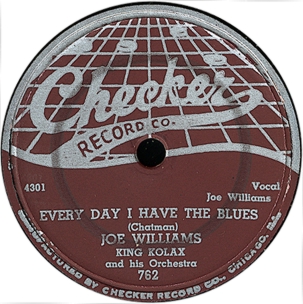
Joe Williams (voc); acc. by King Kolax (ldr; tp except -1, 2, 3); Bennie Green (tb except -2, 3); Dick Davis (ts except -1, 2, 3); Prentice McCarey (p); Ike Perkins (eg except -2); Mentho "Cowboy" Martin (b); Kansas Fields (d); unidentified females and males (vocal group -1).
Universal Recording, Chicago, c. July 1952
| 4301 | Every Day I Have the Blues (Chatman-York) | Checker 762, Regent 6002, Savoy MG 12216, SJL 1140, Denon/Savoy SV-0199 [CD], MCA 380-596 [CD] | |
| ? | Kansas City Blues (Basie) -3 | Regent 6002, Savoy MG 12216, SJL 1140, Denon/Savoy SV-0199 [CD] | |
| ? | Safe, Sane, and Single (Jordan-Heuth-Lang) -1 | Regent 6002, Savoy MG 12216, SJL 1140, Denon/Savoy SV-0199 [CD] | |
| 4305 | They Didn't Believe Me (Kern-Rourk) -2 | Checker 762, Regent 6002, Savoy MG 12216, SJL 1140, Denon/Savoy SV-0199 [CD] |
Our information comes from the liners to the Denon/Savoy CD, except that these give 1951 as the date (Leadbitter, Fancourt, and Pelletier say 1952). On "Every Day," Williams is overdubbed on himself. We have heard that an early release may have dispensed with the overdubbing, but the copies of Checker 762 that we have heard already include it. Matrix numbers are taken from a copy of Checker 762 in Tom Kelly's collection. Previous discographies have incorrectly shown U4304 as the matrix number for "Every Day."
These tracks were originally recorded by Al Benson, before the inception of his Parrot and Blue Lake labels, then leased to the Chess brothers. Two sides were released on a Checker single in September 1952 (this Checker single was still for sale in 1960; see the list reproduced in Paul and Beth Garon's book on Memphis Minnie). The matrix numbers appeared only on the Checker release; it is not known which numbers were assigned to "Kansas City Blues" and "Safe, Sane, and Single," which were not picked up by the Chess brothers—or never released by them. Since U4302 through U4304 remain unaccounted for in the matrix series that Benson was using, most likely the other matrix numbers were in this range.
However, in March 1956, Parrot/Blue Lake was sold, and by the fall of that year the label had become inactive. Four tracks from this session (including the two already in print on Checker!) were sold to Regent/Savoy and issued in 1956 on Regent 6002, coupled with 6 Williams tracks with Red Saunders, which had been recorded for Blue Lake in 1953.
The 4 tracks from this session were released in 1956 on the aforementioned LP Regent 6002; they later appeared on LP as Savoy MG 12216 as Joe Williams Sings Everyday and were reissued (in 1984) on Savoy SJL 1140 under the title Everyday I Have the Blues; the other Joe Williams material on these same LPs was made with the Red Saunders band (see our Red Saunders Discography). The Savoy album was reissued on its entirety on CD as Denon/Savoy SV-0199; issued in 1993, this reverted to the title Sings Everyday. "Everyday" was also reissued in 1999 on Chess MCA 380-596, a 15-CD extravaganza titled The Chess Story 1947-1975.
The use of the horns is most sparing on these tracks. Although Sun Ra reportedly did some arranging for King Kolax, nothing here suggests his involvement.

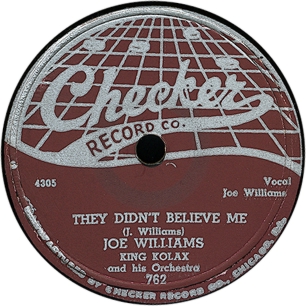
While at the Paris Club, Kolax probably added alto saxophonist Porter Kilbert to the group for a time (he and Kilbert had been bandmates with Mr. B in 1946). Kilbert had left Red Saunders in January 1952 to go out on his own as a leader, but he did not appear on the Local 208 contract list during the summer; he would resurface as a leader in early November 1952, when he posted a contract with the Pepsi Lounge. When Kurt Mohr interviewed Kilbert (this was a few months before his death, while Kilbert was in Europe with Quincy Jones in 1960), Kilbert remembered working with the King Kolax Band in July and August 1952. However, he also remembered the band being at Basin Street, an establishment that King K played in February and March 1955, and while he recalled Dick Davis on tenor sax, he also recollected a rhythm section of Billy Wallace, Dave Shipp, and William Hobbs—who were not in Kolax's band then. We know that Kilbert was in a band that Dave Shipp led at Basin Street in September 1954; he also recorded for Vee-Jay with Shipp in November. Perhaps Kolax spent some time in Dave Shipp's band, though he definitely did not appear on the recording session, which featured Melvin Moore on trumpet.
Around this time, King Kolax attended a student recital at De Paul University, where both Ramsey Lewis and Fred Kaz performed. King K was so taken with Kaz's playing on an original composition that he "spirited me away to his wondrous Paris Club, saying, "The only way to a man's jazz is through his blues!" Kaz recalls that besides King Kolax and Dick Davis, pianist Max Miller often played the Paris Club.
After this particular run at the Paris Club, we next find William Little's 2-week contract with the Leather Glove (accepted and filed September 4, 1952). Unless Kilbert switched to baritone sax for the session (something we have not heard of him doing), he is not on the group's next recording date, behind Johnny Sellers.
Johnny Sellers was the same man who recorded gospel songs as Brother John Sellers for Miracle in 1946 and 1948. He was born May 27, 1924 in Clarksville, Mississippi. While in the South he performed in minstrel shows, but by the early 1940s in Chicago Sellers was singing gospel with Mahalia Jackson. He recorded blues for J. Mayo Williams' Southern label in 1945 (some of these sides were dealt to King), for the RCA Victor label in 1947 (backed by Willie Dixon), and for King Records again, with a group led by Sonny Thompson, in 1951. He signed with Chance in May 1952.
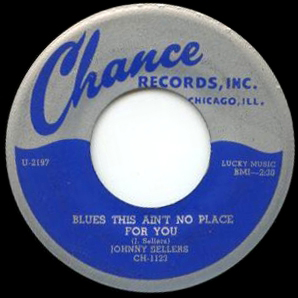
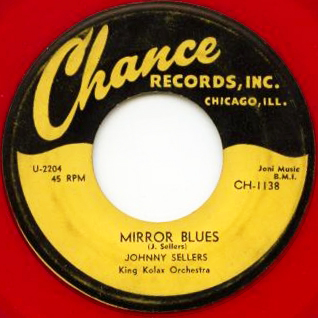
Johnny Sellers (voc) accompanied by the King Kolax Orchestra: King Kolax (tp, ldr); Dick Davis (ts); unidentified (bars -2); poss. Prentice McCarey (p -2, org -1); prob. Rudy Green (eg -2); prob. "Cowboy" Martin (b); prob. Little Gates (d).
Universal Recording, Chicago, September 1952
| U-2197 | Blues This Ain't No Place for You (Sellers)^ -1 | Chance 1123 | |
| U2198 | Too Many Heartaches | unissued | |
| U2199 | The Jay Bird Story | unissued | |
| U-2220 [should be U-2200] |
Mighty Lonesome (Sellers)^ -2 | Chance 1123 | |
| U2201 | Christmas Time Blues | unissued | |
| U-2202 | Newport News (Sellers) | Chance 1138 | |
| U2203 | The World | unissued | |
| U-2204 | Mirror Blues (Sellers) | Chance 1138 |
Our basic information comes from Jepsen's Jazz Records. However, Jepsen and other sources have reversed U-2204 and U-2202, and given "Newport Blues" as the title instead of "Newport News." Chance 1123 and 1138 were 78 and 45-rpm singles, released in November 1952 and June 1953. On Chance 1123, the matrix number for "Mighty Lonesome" is misprinted as U-2220 instead of U-2200. Johnny Sellers later returned to gospel music, recording as Brother John Sellers.
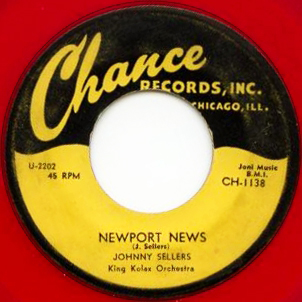
The tenor solo on "Blues, This Ain't No Place for You" is definitely by Dick Davis, and so is the solo on "Mighty Lonesome." While the usual Kolax add-and-subtract pattern is apparent (the guitar and baritone sax do not appear on all tracks for this session), King K. is audible in the ensembles on both sides of Chance 1123 even though he does not solo. Johnny Sellers' vocals are double-tracked on "Mighty Lonesome." Many thanks to Mike Kredinac for a dub of Chance 1123.
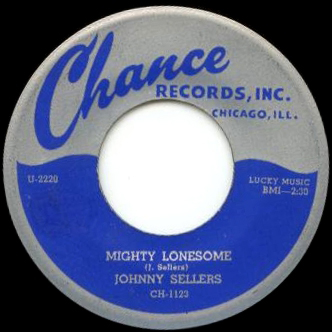
Kolax and combo returned to the Paris Club in late September (indefinite contract accepted and filed on October 2). Signing a contract at the same time was guitarist/singer Danny Overbea, who would use the same band that backed him at the club on his first studio sessions. The shows at the Paris must have been pulling them in, because Kolax was rewarded with another contract for 4 months (posted with Local 208 on December 4).
King Kolax was able to develop a relationship with Al Benson, who handled Overbea's first session for Checker. At the time Benson was doing independent recording and selling his masters to other companies; in mid-1953, Benson would open his own labels, Parrot and Blue Lake. The Kolax band also got a little more work backing vocalists for Chance Records.
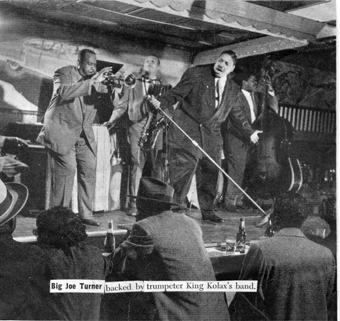
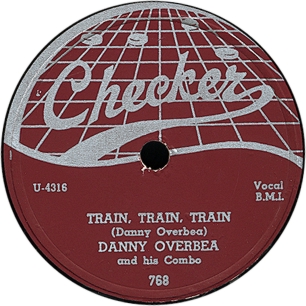
Danny Overbea (voc, eg) with King Kolax Orchestra: King Kolax (tp, ldr); Dick Davis (ts); Prentice McCarey (p); "Cowboy" Martin (b); Little Gates (d).
Universal Recording, Chicago, c. December 1952
| U-4316 | Train, Train, Train (Overbea) | Checker 768, Checker LP 2975, Chess CHD4-9352 | |
| U-4317 | I'll Wait (Overbea) | Checker 768 |
Our session information comes from Robert Pruter's two-part article, "The Danny Overbea Story," in Juke Blues. Overbea himself was the source for the personnel. These sides (like others at the beginning of the U4300 series) were recorded by Al Benson, then sold to the Chess brothers. Checker 768 was released in January 1953. Some copies of the 45 bear the additional numbers E3KW 0148 and 0149 in the trail-off vinyl, signifying that they were pressed by RCA Victor.
According to the Checker Album Discography, Checker LP 2975 was a various artists compilation titled Hits That Jumped. It was released in 1959; the other artists included Jimmy McCracklin, The Lewis Sisters, Earl Washington, and Bobby Lester & the Moonlighters. Chess CHD4-9352 is a box titled Chess Rhythm and Roll; it was released in 1994.
Kolax is audible in two places on "Train, Train, Train," one of them the brief but flamboyant ending, and Davis can be heard briefly riffing with Kolax; no baritone sax is present, although one can be heard on Overbea's next released session. "I'll Wait" is a slower blues, less of a solo vehicle for Overbea's guitar, with a lot of riffing by Davis and Kolax; Kolax keeps his mute in. Davis also gets a short solo. On "Train, Train, Train," Benson multitracks Overbea's voice, albeit with less annoying results than on the Joe Williams session a few months earlier.
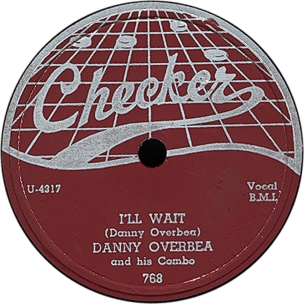
A significant source of puzzlement is another Danny Overbea session for Checker that took place very close in time to this one (i.e., around December 1952). It was given matrix numbers in the company's main series, U7493 through U7497. The reported titles include "Walkin' with Danny" and "Flight of Danny." We can say no more about these because none of them have ever been issued.
In December 1952, Duke Ellington dropped in at the Paris Club while the Blue Note (where his band often played in Chicago) was closed for Christmas. While Ellington sat in a booth near the bandstand, King Kolax played a solo on his own tune, "Facing East." Fred Kaz recalls:
In a tribute to King Kolax all can see, Duke begins scribbling furiously, in an excellent comic put-on of a "plagiarist." Folks smile and chuckle. King, just perceptibly, bows to Ellington. Duke mouths, "Love You Madly!"
While the Kolax band continued at the Paris Club, Danny Overbea was brought back for 3 weeks (contract posted with Local 208 on January 22, 1953). Overbea would move on to the Crown Propeller Lounge at the end of month, while Kolax remained firmly ensconced at the Paris (on March 19, he posted a contract for another 6 months at the club).
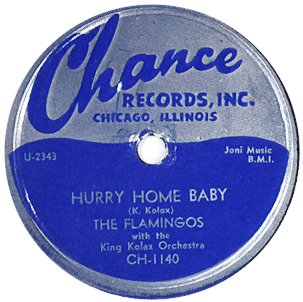
The Flamingos: Jacob Carey, Ezekiel Carey, Paul Wilson, John Carter, Sollie McElroy (voc); King Kolax Orchestra: King Kolax (tp, ldr); Dick Davis (ts); Prentice McCarey (p); "Cowboy" Martin (b); Little Gates (d).
Universal Recording, Chicago, January 28, 1953
| U-2342 | If I Can't Have You (Gonzales) | Chance 1133, Vee-Jay LP 1052, Constellation CS-3, Rhino CD 70967, Vee-Jay CD 706, Uggh 501 [CD] | |
| U-2343 | Hurry Home Baby (Kolax) | Chance 1140^, Vee-Jay LP 1052, Constellation CS-3, Instant [UK] CD 5072, Vee-Jay CD 706, Uggh 501 [CD] | |
| U-2344 | That's My Desire (Loveday-Kresa) | Chance 1140^, Vee-Jay LP 1052, Constellation LP CS-3, Rhino CD 70967, Vee-Jay CD 706, Uggh 501 [CD] | |
| U-2345 | Someday, Someway (Gonzales) | Chance 1133, Vee-Jay LP 1052, Constellation LP CS-3, Instant [UK] CD 5072, Vee-Jay CD 706, Uggh 501 [CD] |
Basic session information from the Mohr-Flückiger-Demeusy files. MFD give the location as Chicago and the date as 1952-1953. The January 28, 1953 date comes from our research for the Chance discography.
MFD list the last title as "Someday Sweetheart" but all releases give it as "Someday, Someway." MFD misrender the first title as "If I Could Have You."
Chance 1133 was issued in March 1953 on 78 and 45 rpm; according to Robert Ferlingere, some copies were pressed on red vinyl, though the black vinyl instances are more common. Chance 1140 appeared in June 1953; again, red vinyl is less common than black. There are doo-wop "repros" of both singles (West Coast repros, according to Ferlingere) in both red and black vinyl.
Vee-Jay LP 1052 was called Flamingos Meet the Moonglows "On the Dusty Road of Hits,": and was released in 1962. Constellation LP CS-3 was called The Flamingos: Collector's Showcase Vol. 3, and was released in 1964. Rhino CD 70967 was called The Best of the Flamingos, and was released in 1990. Instant CD 5072 was called I'll Be Home, and was released in 1993. Vee-Jay CD 706 was called The Flamingos Meet The Moonglows "On the Dusty Road of Hits," but was not a rerelease of VJLP 1052, as it was further subtitled on the package as "The Complete 25 Chance Recordings." It was released in 1993. Uggh 501 is a bootleg CD, released in 1998 under the titleThe Flamingos & The Moonglows: Their First Recordings. It appears to duplicate Vee-Jay CD 706, with the addition of the first two Moonglows sides, which were recorded in Cleveland and originally appeared on the Champagne label.
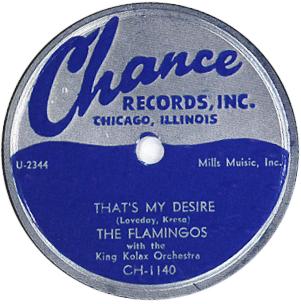
Existing discographies mention no personnel beyond the singers and King Kolax. Dick Davis is obviously present on the session, soloing with authority on "If I Can't Have You," "Someday, Someway," and "Hurry Home Baby." Meanwhile King K is his usual elusive self, sneaking tightly muted into the riffs on "If I Can't Have You." His presence on "That's My Desire" and "Hurry Home Baby" borders on the subliminal. On the other hand, he is fairly prominent on the jump "Someday, Someway." We are assuming that the rhythm section is the same as on the Danny Overbea recordings.
It is interesting to note that singer Bobby Prince (under his real name, Charles Gonzales) wrote four tunes for the Flamingos, which appeared on Chance 1133 (both sides), Chance 1145, and Chance 1149 (one side each).
The Flamingos made 9 more recordings for Chance in 1953 and 1954. Although some of these include a trumpet player, they do not have Dick Davis (or his successor, Harold Ousley) on tenor sax. For these sessions, Chance employed groups led by Red Holloway or Al Smith.
Two sides by Mitzi Mars ("I'm Glad" [U4354] b/w "Roll 'Em [U4355]) were recorded by Al Benson on March 29, 1953 and released on Checker 773. Jepsen's Jazz Records cites King Kolax as the accompanist, as does the Chess Rhythm and Rollbox (Chess CHD4-9352) on which "Roll 'Em" was reissued in 1994. "Roll 'Em," however, contains no trumpet; just a tenor sax (who sounds like Sax Mallard), piano, bass, and drums. Moreover, the original release identifies the band as Sax Mallard and Orchestra. See the Sax Mallard Discography.

Danny Overbea (voc, eg) with King Kolax Orchestra: King Kolax (tp, ldr); Dick Davis (ts); Prentice McCarey (p); "Cowboy" Martin (b); Little Gates (d).
Chicago, c. April 1953
| U-4363 | 40 Cups of Coffee (Overbea) | Checker 774, Checker LP 2975, Chess CD #, MCA 380-596 [CD] | |
| U-4364 | I'll Follow You (Overbea) | Checker 774 | |
| U-4365 | Walkin' Blues | unissued | |
| U-4366 | Woman Woman | — |
Our information comes from Robert Pruter's 2-part article, "The Danny Overbea Story" in JukeBlues. Overbea himself supplied the personnel. However, Overbea recalled a baritone saxophonist (whose name he couldn't remember) on all of his sessions with Kolax and none can be heard here.
Because the U4300 matrix series was being used for regular Chess and Checker sessions between January and May 1953, it seems that by now Overbea was under contract to the Chess brothers. Al could have supervised the session, though. Checker 774 was released in June 1953.
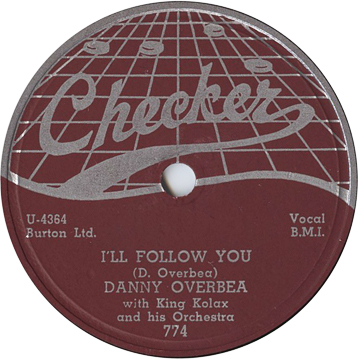
There is some uncertainty about the unissued tracks here. Pruter's article mentions one unissued item, "If I Could Love You." Chess discographies list the two unissued items shown above.
According to the Checker Album Discography, Checker LP 2975 was a various artists compilation titled Hits That Jumped. It was released in 1959. The Chess CD was released in 1998; it was a 2-CD collection titled Chess Blues Guitar. "40 Cups" was also reissued in 1999 on Chess MCA 380-596, a 15-CD extravaganza titled The Chess Story 1947-1975.
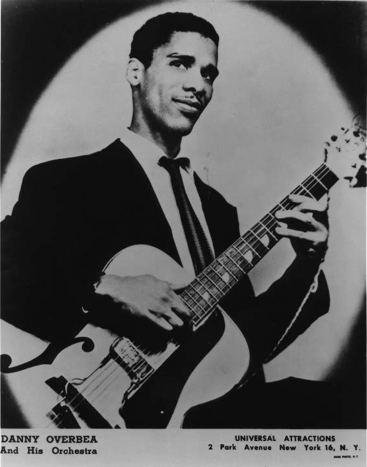

Rudolph Spencer "Rudy" Greene (eg, voc) with King Kolax Orchestra: King Kolax (tp, ldr); Dick Davis (ts); Prentice McCarey (p); "Cowboy" Martin (b); Little Gates (d).
Universal Recording, Chicago, late spring 1953
| C-5028 | Good Woman Blues | unissued | |
| C-5029 | Love Is a Pain (Green) | Chance 1139 | |
| C-5030 | It's Been a Long Time Baby | unissued | |
| C-5031 | No Need of Your Crying (Green) | Chance 1139 |
Our basic session information comes from the MFD files. Chance's handling of matrix numbers was erratic, but the label seems to have switched to the C5000 series early in 1953. (Leadbitter and Slaven give 1952 as the date, and do not specify personnel, but they include C5028, not mentioned by MFD, and give a title for C5030).
The details for Chance 1139 are confirmed from copies in the collection of George Moonoogian and Robert L. Campbell. Other sources spell the singer's surname as "Greene," but the original Chance labels have "Green." Chance 1139 was released in July 1953 (see the "Rhythm & Blues Tattler" in Billboard for August 1, 1953).
Having heard Chance 1139, we can safely say that King Kolax used his regular combo from this period with Dick Davis on tenor sax. Both sides are given over to Greene's singing and guitar soloing, so King K's band is restricted to an accompaniment role.

King Kolax (tp); Dick Davis (ts); Prentice McCarey (p); "Cowboy" Martin (b); Little Gates (d).
Universal Recording, Chicago, late spring 1953
| C-5032 | unknown instrumental | unissued | |
| C-5033 | Groovin' the Blues | unissued |
Information from a listing of the Chance label, by the late Marcel Chauvard. These two tracks almost certainly came from the tail-end of the Rudy Green session.
An ad in the Chicago Defender for May 9, 1953 included King Kolax on the "Annual Jazz Festival" bill at the Fifth Avenue Ballroom (10 South California Avenue). Sonny "Stith" was the headliner, and Danny Overbea and Tommy "Madman" Jones were also on the bill. The Defender for May 23 still had the King Kolax Combo playing at the Club Paris (1652 West Madison) as the backup band for one of the revues that were so common then, featuring Dahl Scott (vocalist), Bunky Redding (MC), Lewis & Chisolm, Paris Lovies, and the 5 Flamingos. The band members listed were Dick Davis, (tenor) sax, Prentice McCarey, piano, Cowboy Martin, bass, and Little Gates, drums.

Mabel Scott (voc) with King Kolax (tp); Sonny Cohn (tp except -1); Fip Ricard (tp except -1); Harlan "Booby" Floyd (tb except -1); Porter Kilbert (as except -1); Leon Washington (ts except -1); McKinley Easton (bars except -1); Earl Washington (p); prob. Jimmy Richardson (b); Red Saunders (Latin perc -1; d).
Universal Recording, Chicago, May 1953
| U2550 | Mr. Fine (Scott) | Parrot 780, Jukebox Lil [Swe] JB606, Relic LP 8020, Relic CD 7027, Classics 5107 [CD] | |
| U2551 | Mabel Blues (Scott) | Parrot 780, Jukebox Lil [Swe] JB606, Classics 5107 [CD] | |
| U-53173 | Fool Burro (D. Williams, Jr.) -1 | Parrot 794, Classics 5107 [CD] | |
| U-53174 | Do the Thing (D. Williams, Jr.) | Parrot 794, Classics 5107 [CD] |
Mabel Scott (1915-2000; she was married to Charles Brown from 1949 to 1951) was normally based in LA. However, Leadbitter, Fancourt, and Pelletier have her coming to Chicago for this Parrot session. LFP identify King Kolax's band as the accompanists, but give no further information.
Parrot 780 and 794 were released in July 1953 and either December 1953 or January 1954. Jukebox Lil JB606 was a Swedish LP, released in the 1970s, of Mabel Scott material. Relic 7027, Rockin' at Midnight at the Parrot Club, was a CD issued in 1990, consistently of R&B from the Parrot label: artists included Lou Mac, the Five Thrills, Browley Guy, and Marvin Phillips, among others. Classics 5107, Mabel Scott 1951-1955, was released in 2004.
What we have on U2550 and U2551 (which immediately precede U2552 and U2553 by The Chocolateers, from the same date) is the Red Saunders band with King Kolax as a guest soloist. Kolax is obviously the somewhat coarse, muted trumpet soloist on "Mr. Fine." The band is way too large to be the Kolax combo of the period, and it sounds like the same Red Saunders ensemble that backed the Chocolateers. Mac Easton has a brief tag near the beginning of "Mr. Fine" and a longer solo in the middle that are unmistakable; the impeccably recorded drummer is definitely Red. There is no electric guitar anywhere on the session, contrary to LFP. "Mabel Blues" fleetingly features Booby Floyd, Leon Washington, and Porter Kilbert.
Further support for a Saunders connection derives from the fact that Mabel Scott was the star attraction at the Club DeLisa for the week of May 16, 1953; the revue was called "A May-Hey Day."

Two more Mabel Scott sides appeared on Parrot 794: "Fool Burro" (U53173) and "Do the Thing" (U53174). We thought these were from a different session in the fall of 1953, because of the different matrix series, but Donn Fileti (owner of Relic Records, who controls most of the remains of Parrot and Blue Lake) says that they came from the same session as "Mabel Blues" and "Mr. Fine". The matrix numbers from the U 53100 series, which Parrot moved to in August 1953, were attached to Parrot 794 at the time of release. "Fool Burro" is a Latin-themed number using just King Kolax and the rhythm section. "Do the Thing" is a peppy dance number that returns to the full band but features no instrumental solos.
According to Fileti, the tape box gives June 10, 1953 as the date, but Al Benson appears to have consolidated several sessions from April and May 1953 when he decided to give Parrot Records a formal launch. The session pretty much had to coincide with Mabel Scott's appearance at the Club DeLisa.
On July 7, 1953, the Kolax group opened at the Toast of the Town, a new club located at 6312 Cottage Grove (Kolax posted an indefinite contract on July 2, extended on August 20). Danny Overbea was brought in as a featured attraction (his 2-week contract with the same club was posted on July 2 with an extension following on August 20). Harmonica virtuoso Rhythm Willie was also part of the show. The contract extensions were posted in anticipation of Kolax and Overbea's return from a trip to Cleveland, where they shared the billing at the Ebony Lounge from August 17 through 30. (Our thanks to Chris DeVito for locating an advertisement in the Cleveland Call and Post.)
The Toast of the Town even brought in T-Bone Walker as a guest headliner (1-week contract posted with Local 208 on September 3); apparently, Walker went over well, since the club brought him back for 5 more weeks in November (contracts posted on November 5 and 19 and December 17).
Danny Overbea (voc, eg) with King Kolax Orchestra: King Kolax (tp, ldr); Dick Davis (ts); unidentified (bars); Prentice McCarey (p); "Cowboy" Martin (b); Little Gates (d).
Universal Recording, Chicago, September 1953
| 7549 | I Could, But I Won't (Overbea) | Checker 784 | |
| 7550 | Sorrento | Checker 784 | |
| Too Deep Blues | unissued | ||
| Tell Me How | unissued |
Information from Robert Pruter's two-part article, "The Danny Overbea Story," in Juke Blues. Checker 784 was probably released in November 1953. The label copy is derived from a photo of a 78-rpm Checker 784 offered for sale on ebay. Overbea sang "Sorrento" in Italian. The last two items have never been issued, so we have been unable to check them. They appear to have been left unnumbered, because U7551 and U7552 belong to a session by Muddy Waters that took place on September 24, 1953.
Rudy Green recorded his second and last session for Chance on October 19, 1953, consisting of C-5066 through 5069; these four sides were released on Chance 1146 and 1151. The backing of as, ts, bars, p, b, and d is definitely not by King Kolax. The baritone saxophonist sounds like Mac Easton; there are no tenor or alto solos, so judgments are difficult.
An ad in the Chicago Defender for Cadillac Bob's Toast of the Town features Al Hibbler, backed by "King Kolax—Dick Davis on sax" (October 22, 1953).
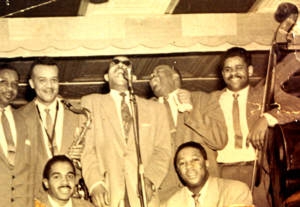
Dick Davis died of pneumonia on January 19, 1954, aged only 36. His place in the Kolax combo was taken by Harold Ousley. Ousley had been a member of Melvin Moore's house band at the Flame Show Bar in the Morocco Hotel (809 East Oakwood). In November 1952 he recorded with Moore's band behind Jo Jo Adams, the MC and blues singer in residence at the Flame. Two sides were released on Chance 1127; on "I've Got a Crazy Baby" Ousley is responsible for a brief but torrid solo, his first on record. Ousley also rehearsed with one of Sun Ra's experimental bands during this period.
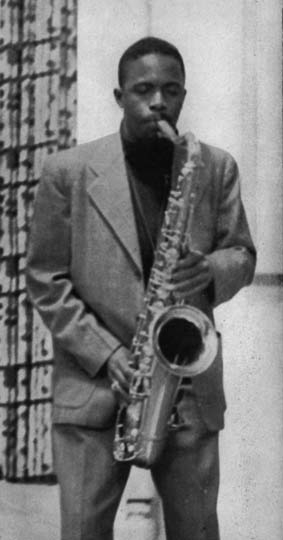
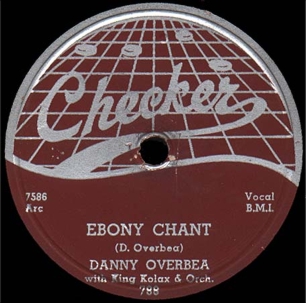
Danny Overbea (voc, eg) with King Kolax and Orchestra: King Kolax (tp, ldr); Harold Ousley (ts); unidentified (bars); Prentice McCarey (p); "Cowboy" Martin (b); Leon Hooper (d).
Universal Recording, Chicago, c. January 1954
| 7583 | The Pain | unissued | |
| 7584 | Stomp and Whistle (Overbea) | Checker 788 | |
| 7585 | Ooh | unissued | |
| 7586 | Ebony Chant (Overbea) | Checker 788 |
Our basic information comes from Robert Pruter's two-part article, "The Danny Overbea Story," in Juke Blues. Checker 788 was a single released in March 1954.
Danny Overbea made four more sessions for Checker in Chicago (April 1954; September 27, 1954; March 1955; and January 1956) but none of these included the King Kolax band.
"Ebony Chant" is an instrumental designed to feature Overbea's guitar soloing and a few of his vocal effects, but Ousley is prominent in the accompaniment. One wonders whether the band's excursion to Cleveland a few months earlier helped to inspire the choice of name.

In March 1954, King Kolax (signing as William Little again) started another engagement at Cadillac Bob's Toast of the Town—to recite the name in its full splendor. (The indefinite contract was posted with Local 208 on March 18.) On April 10, the Defender once again announced Al Hibbler as the headliner. Toward the end of June the band moved to the Crown Propeller Lounge (indefinite contract posted on July 1).
The Kolax band was ensconced at the Crown Propeller for the rest of the year, backing a series of headliners along with 4 or 5 chorus girls, vibes player Pete Diggs, and, of course, "exotic aqua queen" Atlantis.
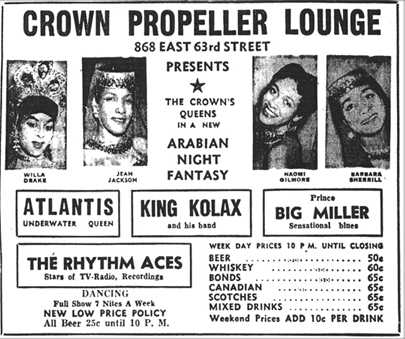
Large display ads for the club ran every week.
Vee-Jay Records assimilated the remains of Chance in late 1954. Around this same time, King Kolax, who had no doubt attracted attention during his Crown Propeller run, was invited to record for the new label. What he got from it was two sessions, which led to just one single on Vee-Jay. All of his jazzier material was held out of release until Kurt Mohr featured it on two Top Rank compilations in 1961 and 1962, and some tracks are still unreleased after 56 years. Nor was Kolax's band invited to accompany vocal acts for Vee-Jay; even though the company's recording activities were on the brink of a major expansion. Al Smith, Lefty Bates, and Red Holloway already had those assignments sewed up.

King Kolax [William Little] (tp, ldr, voc); Harold Ousley (ts); Prentice McCarey (p); Mentho "Cowboy" Martin (b); Leon Hooper (d, Latin perc); Grant Jones (voc); unidentifed female (voc -2); prob. Sun Ra (arr -1).
Universal Recording, Chicago, December 22, 1954
| 54-222 | What Have You Done to Me [GJ voc] | Charly CRB 1043, RST 1580 [CD], P-Vine Special [J] PCD 5271/4 | |
| 54-223 | Right Now [GJ, ens voc] | Top Rank RLP 111, RST 1580 [CD] | |
| 54-223 [alt.] | Right Now [GJ, ens voc] | Charly CRB 1043 | |
| 54-224 | Push Out [KK, ens voc] -2 | Charly download | |
| 55-225 | Vivian (Kolax) -1 | Vee-Jay 136 | |
| 55-225 [alt.] | Vivian (Kolax) -1 | Charly download | |
| 55-226 | Goodnite Blues (Kolax) | Vee-Jay 136, Top Rank RLP 110 | |
| 55-226 [alt.] | Goodnite Blues (Kolax) | Charly CRB 1043 |
Session details from Lord's Jazz Discography. Lord has only 54-223 (misnumbered 54-233), 55-225, and 55-226. The other items were filled in from Leadbitter and Slaven's Blues Records 1943 to 1970 A-K(1987). Leadbitter and Slaven have "Good Night Blues" for 54-225, and they give 54- as the prefix throughout (whereas Kurt Mohr gave 55- as the prefix for the last two items). It was supposed to be 54-, of course.
Vee-Jay 136 was a single released around June of 1955. Top Rank RLP110 was a French LP titled Jazzville Chicago Volume 1. RLP111 was titled Jazzville Chicago Volume 2. Both were compiled by Kurt Mohr, and issued in 1961 and 1962, respectively. Top Rank was a label belonging to the Rank Organisation in Britain; at the time Rank had a licensing agreement with Vee-Jay.
The first, second, and fourth tracks were also issued on Charly LP CRB 1043, Rootin' and Tootin', a collection of Chicago R&B from small labels that was issued in 1985. The Charly LP notes incorrectly put "Right Now" on the next recording session. RST 1580 is an Austrian CD titled Grant "Mr. Blues" Jones: In the Dark (1949-1958). P-Vine Special PCD 5271/4 is a Japanese 4-CD box from 2000 titled Vee-Jay, The Chicago Black Music.
The Charly LP employed different takes from the Top Rank LPs, without drawing any attention to that fact. Our thanks to Daniel Gugolz and Chris Trent for helping to sort out the alternate takes.

A various-artists collection from Charly, available for download in Europe since 2006 or so, is titled Blues Classics: Blues Get off My Shoulder and includes several items derived from Vee-Jay, including "Push Out" and an alternate take of "Vivian" from this session. (There are noticeable differences between Harold Ousley's tenor sax solos on the two takes.) See http://www.amazon.co.uk/gp/product/B0056Q4TFA/ref=sr_1_album_7_rd?ie=UTF8&child=B0056Q4ZP4&qid=1317851782&sr=1-7. Only European customers are allowed to download from that source.
Ken Ellzey has suggested possible Sun Ra arrangements on this King Kolax session and the next one. Ra spoke of working with Kolax in interviews but revealed no details. And Harold Ousley was a member of an early Sun Ra band (in 1952). Still, there is no need for Sun Ra arrangements (or anybody's arrangements) on typical jumps and slow blues like "Right Now," "What Have You Done to Me?," or "Goodnite Blues." Or on "Push Out," which turns into a jazz number after the dance-inciting vocal. However, "Vivian" (presumably named after Vivian Carter of Vee-Jay) is a misterioso Latin number with percussion breaks built right into the theme. Off the beaten path for King Kolax, but straightforward for Sun Ra at this time. Harold Ousley did not want to rule out "Vivian" as a Sun Ra arrangement either: "Kolax wrote a lot himself, but he also used a lot of other people's stuff."
King K's band left the Crown Propeller in January 1955; an Al Smith combo replaced it. During February and March, the band was playing for two nights a week at Basin Street; by the end of its run the band was playing on the weekends. The King Kolax "Quintette" subsequently moved into the Grand Terrace, which was going through its third-last revival (which would be followed by successively feebler attempts in 1956 and 1957). The New Grand Terrace formally opened on May 12, 1955; King K posted his contract with the Terrace on May 19. An ad in the Chicago Defender for July 9 describes King Kolax & Band as the house ensemble there. Kolax also returned to Basin Street at least once (a one-week contract was posted on June 2). The Grand Terrace engagement probably wound down around the end of July; in a pattern that would become all too familiar, the club quit booking ads and then shut down for a while. In mid-August, the Terrace reopened with a new show; Memphis Slim was now the headliner. The Terrace's last effort in 1955, an elaborate show featuring Sun Ra and an early version of his Arkestra, would carry into early December.
Kolax got himself into a little hot water with Local 208 on June 16, 1955. He had a one-nighter lined up for May 28, at Tenkley Hall in East Chicago, Indiana, and when it became clear he wouldn't be available for the engagement, he transferred it to a musician named Sam Matthews, who wasn't a member of the Union.
On August 1, 1955, Kolax and quintet started an engagement (probably one week) at the Hurricane on Centre Avenue in Pittsburgh. Rudy Greene was also on the bill ("Hot Trumpeter, King Kolax, at Hurrican Aug. 1," Pittsburgh Courier, July 30, 1955, p. 20).
King Kolax [William Little] (tp, voc, ldr); Harold Ousley (ts); Prentice McCarey (p); Malachi Favors (b); Leon Hooper (d); Grant Jones (voc); Calvin Carter (voc).
Universal Recording, Chicago, September 16, 1955
| 55-326 | Those Rhythm and Blues [CC voc] | Top Rank RLP 110 | |
| 55-326 [alt.] | Those Crazy Rhythm 'n' Blues [CC voc] | Charly CRB 1043 | |
| 55-327 | H2O -1 | Top Rank RLP 110 | |
| 55-328 | Traveling | unissued | |
| 55-329 | Time [KK voc] | Top Rank RLP 110 | |
| 55-330 | Enchanted Moods | unissued | |
| 55-331 | Four Dimensions | unissued |
Session details from Lord's Jazz Discography, except that Lord omits 55-328, 330, and 331, which were filled in from Leadbitter and Slaven, Blues Records 1943 to 1970 A-K (1987).
Lord (and the Charly compilers) credit Grant Jones with the vocal on "Those Crazy Rhythm 'n Blues" but he is not present on it. The Mohr-Flückiger-Demeusy files reveal that it was Calvin Carter, the brother of Vivian Carter, who impersonated the female fan who wants to hear "those crazy rhythm 'n' blues." Two takes survive. On the take issued by Top Rank, which left "crazy" out of the title, Carter starts with, "This the place you been talkin' about?" On the take issued by Charly, the speech begins, "Here comes my doghouse daddy." And after King Kolax's solo, Carter says, "That was King Kolax... my sister-in-law used to like him, that's how I know."
This session was intended for release on Vee-Jay but none were ever issued by that label. (Apparently the company had lost interest even in blues vocals from King Kolax.) Top Rank RLP110 was a French LP titled Jazzville Chicago Volume 1. It was compiled by Kurt Mohr and issued in 1961. An alternate take of one of the tracks was also issued on Charly CRB 1043, Rootin' and Tootin', an LP collection of Chicago R&B derived from the Vee Jay label. The Charly LP incorrectly gives "Cowboy" Martin and not Malachi Favors as the bassist.
"Those Crazy Rhythm 'n' Blues" is standard jump-band R&B. "Time" is an ordinary slow blues; no need for a written arrangement from Sun Ra... "H2O" is a straight bebop number. The other tracks have not been checked because they were still unreleased as of 2012, and are still unreleased today, but obviously "Enchanted Moods," and "Four Dimensions" do sound a bit promising as far as Ra arrangements go.
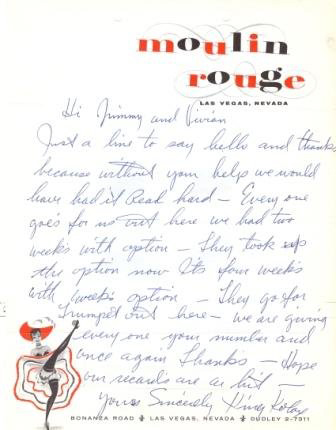
Shortly after this session, King K and his combo played 4 weeks in Las Vegas. The Strip in those days was segregated; few Black entertainers had performed there, and those who made appearances over the next few years would not be allowed to stay in the hotels where they were working. However, on May 24, 1955, a Black-owned hotel and casino called the Moulin Rouge had opened on the West Side of Las Vegas. Joe Louis was among the partners, and Benny Carter was the music director. Ahmad Jamal's trio worked the lounge during the opening week, along with Wild Bill Davis's trio. The Flamingos got four weeks there in July and August (Cash Box, August 7, 1955, p. 25). Dinah Washington was the featured attraction at the Cafée Rouge during August and September. Lionel Hampton signed a contract calling, overoptimistically, for annual engagements over the next several years.
A note to Jimmy Bracken and Vivan Carter on Moulin Rouge stationery was preserved in the Vee-Jay files. King K thanks them for helping him get the gig, which has recently been extended from 2 weeks with an option to 4 weeks with a one-week option. Kolax asks how his Vee-Jay single is selling, so the note is from June or later. The Moulin Rouge, unfortunately, was built with inadequate financing. When "the nut," $3 million in short-term loans, came due, the gambling revenue was not enough to cover the payments, and the operation folded in late October. The Kolax combo played the Moulin Rouge in September and October, probably starting right after their second session for Vee-Jay. Local 208 had to help pay for the musicians' travel back to Chicago when they were stranded in Las Vegas. For the story of the Moulin Rouge, see Nadine Cohodas, Queen: The Life and Music of Dinah Washington (New York: Pantheon, 2004), pp. 212-216, 219-220.
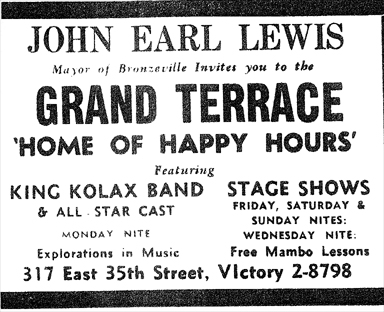
After his Vee-Jay affiliation ended, Kolax surfaced at the Pershing Hotel lounge with a trio in January 1956. He also returned to the Grand Terrace, which had tried Sun Ra's band in a show that ran from early October through early December. He appeared at the Terrace on January 7, and posted an "indefinite" contract on January 19. The Kolax Trio was still around the Pershing during the Spring. During the same period, Sun Ra and his 8 Rays of Jazz were settling into an enagement in the basement, at Cadillac Bob's Birdland (name changed in March to Budland).
In April Kolax moved to the Bee Hive (his contract for 1 week with options was posted on April 19, 1956). In July it was Kolax's turn to replace Sun Ra for a while, when he took a two week engagement at Budland (contract filed July 19). He actually hung on for several more weeks (the last Defender ad to mention his band at Budland appeared on September 8; a September 22 ad makes no reference to any house band, then no ads appeared for a month.) During this run the Kolax backed Dinah Washington, Little Miss Cornshucks, the Delta Rhythm Boys, Floyd Dixon, and a revue that included Andrew Tibbs.
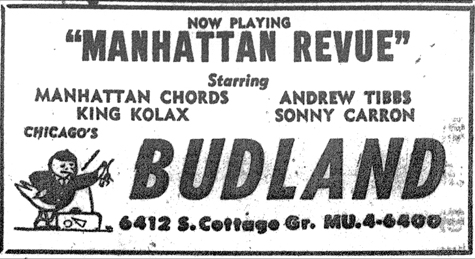
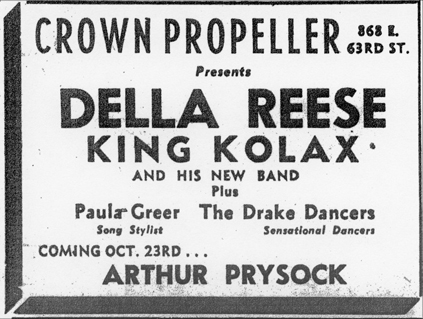
The band next surfaced at an old familiar venue, the Crown Propeller Lounge. Kolax was advertised on October 20, 1956, accompanying Della Reese; on October 27 the Defender mentioned "King Kolax and his new band" backing Arthur Prysock and other artists. This Crown Propeller gig probably lasted two weeks; King K's band was displaced first by Louis Jordan's group and then by Charles Brown's.
Meanwhile, Joe Brown was issuing JOB's more and more sporadically now, but he called King K in for one more session, backing the cavernous bass-baritone vocals of one Earl H. Pugh.
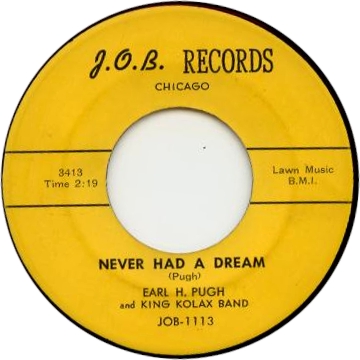
Earl H. Pugh (voc) and King Kolax Band: King Kolax (tp, ldr); Harold Ousley (ts); Prentice McCarey (p); Malachi Favors (b); Leon Hooper (d).
Univeral Recording, Chicago, c. December 1956
| 3413 | Never Had a Dream (Pugh) | JOB 1113 | |
| 3414 | Jealous of My Shadow (Pugh) | JOB 1113 |
Our session information from the Mohr-Flückiger-Demeusy files, which do not identify the bass player and drummer. Leadbitter, Fancourt, and Pelletier specify Cowboy Martin on bass, but Malachi Favors was probably still in the band at this time. The matrix series appears to come from Universal and the items follow the U3300s assigned to the first session for Ping in October 1956.
During 1956, the Pittsburgh Courier (which had a Chicago correspondent) was still operating its "theatrical" poll. This included ranks for bandleaders and musicians, on which its readers voted. Kolax was showing up in the poll that year and the paper ran an occasional blurb about him, such as his "three abmitions." One was of course to win the Courier poll on trumpet. The other two were to "get on the Steve Allen show" and to perform in Paris (December 29, 1956, p. 22). Unfortunately, King K never did either.
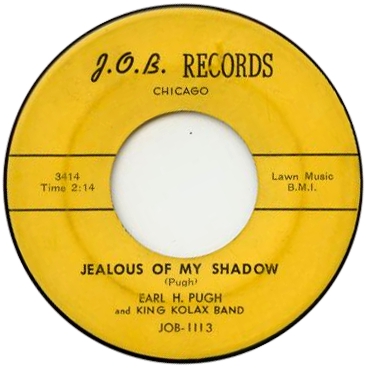
Two photos from early 1957 show King Kolax and his NBC Quintet, with Ousley, McCarey, Malachi Favors (bass), and Leon Hooper (drums). One is a studio shot, with McCarey, a wry expression on his face, holding up a toy piano. The other was taken onstage somewhere in Chicago.
On January 26, 1957, King Kolax and quintet were included in a one-nighter at the Trianon Ballroom, under the sponsorship of DJ Sam Evans. The headliners were Ray Charles and Mickey and Sylvia; Kolax was probably on hand to accompany the local artists on the card, such as the doowop group The Moroccos and soul-blues singer Harold Burrage. Perhaps Al Smith, who in 1957 had most of these shows sewed up, had another commitment to honor that night…
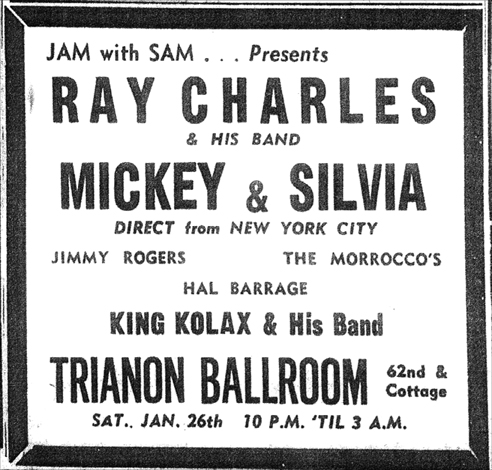
On Febuary 7, 1957, Kolax posted a 2-week contract with the Crown Propeller Lounge, according to the Local 208 Board meeting minutes. It's reasonable to conclude that the contract was extended, although later contract lists do not mention this, and Crown Propeller ads in the Defender from this period, as the club was now in decline, don't credit the house band. No one else appeared on the Local 208 lists for the Crown Propeller until May 2, when Tiny Grimes was the first of several touring leaders to post a contract with the establishment. In February or March 1957, Kolax's quintet at the Crown Propeller included Harold Ousley (tenor sax), Prentice McCarey (piano), Earl Freeman (bass), and Steve Boswell (drums). Malachi Favors had recorded with Andrew Hill for Ping in October of the previous year; now he was a permanent member of Hill's steadily working trio. The Crown Propeller personnel was announced in a Jazz Hot item titled "Chicago Flash!" (no. 120, April 1957) which ran the information along with a photo of Ousley. However, in an article on King Kolax in the same issue, Kurt Mohr identifies his "current" bassist as James Lee. Ousley remembers leaving Kolax after this engagement. He thinks the band was out of work, as he did not have to teach a successor. Ousley played in Sun Ra's Arkestra for a little while (interestingly, Malachi Favors' few rehearsals and gigs with The Ra also took place in 1957) before leaving Chicago with a rock and roll show; his departure from town appears to have taken place in the fall of 1957.
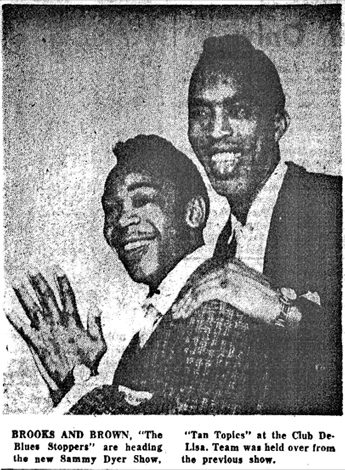
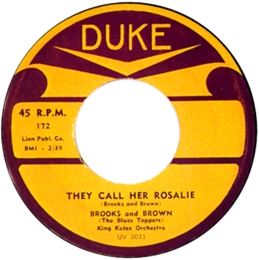
Robert "Billy" Brooks and Piney Brown (voc) with King Kolax Orchestra: King Kolax (tp, ldr), Harold Ousley (ts); unidentified (bars); prob. Prentice McCarey (p); Lefty Bates (eg); James Lee or Earl Freeman (b); prob. Leon Hooper (d).
Chicago, February 26, 1957
| UV 3032 | Sleeping in an Ocean of Tears (Brown-Brooks) | Duke 172 | |
| UV 3033 | They Call Her Rosalie (Brooks-Brown) | Duke 172 |
The team of Billy Brooks and Piney Brown had been active in the Chicago clubs for several months before this date took place. The duo was featured at the Club DeLisa during the fall of 1956.
The MFD files give the lineup, but without identifying Brooks and Brown, and without supplying a recording date. The single was released in May, in 78 and 45 formats; Duke advertised it in Cash Box on May 25 (as part of a big company ad, p. 100), then gave it solo pushes on June 1 (p. 46), June 8 (p. 41), and June 15, 1957 (p. 57). Cash Box reviewed it on June 8, 1957 (p. 40).
Leadbitter and Slaven agree on the lineup, identify Brooks and Brown, and give the recording year. The probables are based on Kolax's known personnel for 1957; Harold Ousley can be positively identified from hearing the record. The Local 208 contract list for February 7, 1957 included a one-day contract between King Kolax and Universal Recording, which may pertain to this session.
Without hearing these sides, Harold Ousley was unable to remember the baritonist or the guitar player. However, from other sources we gather that Chicago's #1 session guitarist, Lefty Bates, made the date. Bates is prominent on both sides of the record and has a brief solo on "They Call Her." Harold Ousley does the tenor sax solo on "Sleeping." The call and response between the two vocalists leaves no time for other instrumental solos, and the pianist's role is restricted to standard blues accompaniment.
Galen Gart and Roy C. Ames, in Duke/Peacock Records: An Illustrated History with Discography (Milford, NH: Big Nickel Publications), state that Billy Brooks' last session for Duke took place on February 26, 1957 (he had recorded in Chicago on October 28 and November 1, 1955, with unknown accompaniment; before that, he'd had a session in Chicago on February 18, 1955, with Red Saunders).
On July 6, 1957, according to an ad in the Defender, King Kolax and His Recording Band headlined at a club that we hope was not too appositely named—the Come Back Trail—with Andrew Tibbs, the 4 Clouds, and The Man from Mars [aka Yochanan]. Tibbs really was on the comeback trail at the time. A contract for two weeks at this establishment was belatedly accepted and filed by Local 208 on July 18, 1957. Located at 5114 Praire Avenue, the Come Back Trail replaced the New Rocket Lounge, which had replaced Sonny's Lounge, which had replaced the Jewell Lounge, which, in turn, had replaced the much more celebrated Ada's Chicken Shack. The Come Back Trail would be in business for only a few months before its owner, Jimmy Caruth, decided he would be better off trying his luck at a couple of different locations. A couple of the blues performers—Andrew Tibbs, even Yochanan—stayed at the Trail longer than Kolax did.
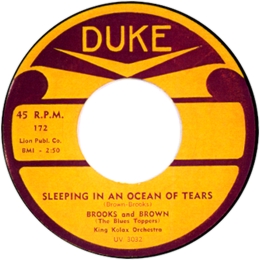
Kolax would post no gigs as a leader with Local 208 during the remainder of 1957. The drought continued for three more years; in fact, we know very little about where he was playing between August 1957 and October 1960. Such club work as he was able to obtain must have been at non-Union establishments (which were becoming more common during this period) or outside Local 208's bailiwick.
He also picked up a little studio work accompanying singers for Stepheny, a new small label with headquarters in Evanston, Illinois. The label was owned by Norman Forgue, who operated Black Cat Press, which specialized in miniature books, and was a managing partner in the Norman Press, a large printing company. He named the imprint after his daughter, whose portrait appeared on the label design used for nearly all releases. Stepheny Records had opened on a limited basis in 1956, then became far more active in July through October 1957, and peaked in 1958, when it began issuing LPs and opened a subsidiary (singles-only) called Spinning. The company would be responsible for around 50 singles (the last one was released in time for Christmas 1960) and 17 LPs (these continued into 1962) before Norman Forgue sold off his audio equipment and closed what was left of the operation.
In October 1957, Stepheny switched over from a 45-03/45-04 series of singles (the different numbers for different sides didn't look professional; the music publishers weren't cited on the labels, which didn't look professional, either). Many items in the new SF1800 series were instant reissues of 45-03s; others may have been intended for release earlier but held back; a few were new recordings.
We don't know who introduced King Kolax to Stepheny. What we do know is that Kolax put together a studio band for a session involving a singer named Clyde Williams, who was called on to perform a new number by one Allen Hall, Sr. (The Stepheny label, for its singles, worked with many different composers of pop tunes in the Chicago area, some new to the business, others well established. It's possible that the songwriter recommended Kolax.) As there was just one song to demonstrate, King K's group got to do an instrumental version on the flip.
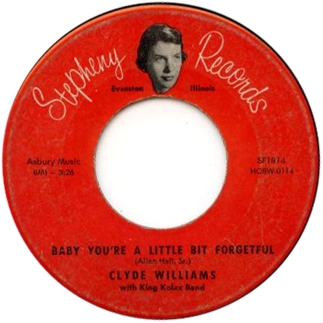
Clyde Williams (voc -1); King Kolax (tp -2); unidentified (ts); Prentice McCarey (p); unidentified (b); unidentified (d); unidentified musicians (strings -1).
prob. RCA Studios, Chicago, September 1957
| HO8W-0114 | Baby You're a Little Bit Forgetful (Allen Hall, Sr.) -1 | Stepheny SF1814 | |
| HO8W-0115 | Baby You're a Little Bit Forgetful (Allen Hall, Sr.) -2 | Stepheny SF1814 |
Stepheny SF1814 was a 7-inch 45-rpm record; the company arrived as 78s were on the way out, and never used the format. We'd previously guessed that Stepheny SF1814 was out in January 1958. In fact, it was October 1957. Stepheny Record bought an ad (the first of two that it would ever purchase) in Cash Box for October 26, 1957 (p. 4). The release numbers for the 8 SF1800 series singles mentioned in the ad include 1814. Because Stepheny had too many singles ready for release at the same time, promotion for some of them was purposely delayed. With SF1814, the solution seems to have been not to give it additional promotion.
The H series matrix numbers indicate that the record was mastered and pressed by RCA in 1957, in September. Consequently, it was part of a lesser wave of recording activity, after Stepheny had used up a lot of studio time in July and August. RCA Custom Pressing's involvement doesn't necessarily indicate that the single was recorded at the RCA Victor Studios in Chicago, but the company did use them and when we don't have positive evidence of another venue, we'll go with RCA Victor. Our thanks to Dr. Robert Stallworth, who alerted us to King Kolax's presence on this single. The procedure of coupling a vocal and an instrumental on the same song wasn't common in 1957.
The A side times in at 3:26 and gives Clyde Williams a pop production. King Kolax doesn't play, there are strings at the beginning and the end of the side, and McCarey's piano is loungey. But here is room for a nice ballad solo by the tenor saxophonist. He is not Harold Ousley, who had been in Kolax's group at the beginning of the year. He is not Eddie Chamblee, who would appear on a Stepheny LP with Kolax. He sounds a bit like E. Parker McDougal. The B side is a jazz instrumental, at a somewhat snappier tempo, timing in at 2:36. Kolax, the tenorist, and Prentice McCarey (now highly recognizable) all get solos.
Clyde Williams, a smooth-singing baritone, had previously belonged to a vocal group called the Fasinoles. As a solo vocalist, Williams was featured with Sun Ra in 1956 and 1957. He recorded two ballads ("As You Once Were" and "Dreams Come True") with Sun Ra's Arkestra on November 1, 1956, on a session initially intended for release on Transition; he probably also recorded "Dreams Come True" on a session for Saturn around this time. "Dreams Come True" wasn't released until 1973, on Saturn; "As You Once Were" had to wait until the 1990s, when it and a different version of "Dreams Come True" came out on a Delmark CD. In September 1957, as the Arkestra's long initial run at Budland was winding down and Alton Abraham was running a special promotion to try to draw more people into the club, he was billed as Clyde "Out of Space" Williams. We're reaasonably sure Williams didn't carry this moniker into the studio with him.
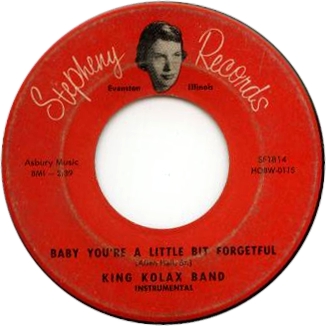
Until we have been able to listen to a bunch of Stepheny singles, we can't entirely rule out the presence of Kolax, or McCarey, or musicians brought into the studio by them. Stepheny singles often didn't name the director of the studio band that the company was using, and never named any other musicians who participated. All we presently know is that the company was sufficiently interested in Prentice McCarey's songwriting (he was composing pop tunes in those days) that it used his ballad on Stepheny SF1816, by a singer named Murphy. McCarey doesn't seem to have performed on the session or done any of the arranging.
We used to think that Kolax rejoined his one-time vocalist, Grant Jones, on another Stepheny session. However, the band on those sides, which were recorded in February 1958, turns out to have been led by tenor saxophonist Mike Simpson (see Appendix C). For that matter, what appears to be the vocal group the Marvellos (see Appendix A) recorded for Stepheny (which called them "Mar-Vellos"), in January 1958, well before the Marvello label opened. We don't know who accompanied them (it would be nice to hear the "Mar-Vello" single, which is one of the harder items on the Stepheny label to find).
Meanwhile, a Kolax group made one studio date for another label in 1958, not that Norman Forgue or Mort Hillman (his sales manager and part-time producer) are likely to have known (or cared) about it.
Once upon a time, we thought that two singles on a tiny label called Weirton were from the 1960s. Since all four tunes were written by the label's proprietor, a musician truly named Weird Dock Gibbs, we've discovered they were done earlier. Weird Dock Gibbs was born in Jellico, Tennessee on October 15, 1923; his father was James Henry Gibbs and his mother was Theo F. Graham Gibbs. He served in the army in World War II. In 1946, when he married Hazel Lee Goines, he was living in Columbus, Ohio. In the late 1940s, according to Talent magazine, he was studying at Capitol College in Columbus and leading a 6-piece band in his spare time; he was also said to have perfect pitch. After a divorce, Gibbs married Virginia Louise Banks in 1953; he was still resident in Columbus and his occupation was given as College Instructor. In 1958, he set up a Weirton Publishing Company in Ann Arbor, Michigan. He had copyrighted "Since It's Over," "Don't Play with Love" and "High, Hot & Ready" in his own name on April 8, May 17, and June 14, 1957, respectively. After setting up the company, he re-copyrighted "High, Hot" on June 25, 1958. The other three tunes from the first Weirton records date were copyrighted that same day. So we can put the session around that time. Whether it was done before or after the Harvey Ellington we can't really determine; we've listed it after the LP. Clyde Williams and King Kolax recorded in Chicago during the 1950s, but Weird D. Gibbs wasn't from there and it would have been more convenient for him to record the band in Detroit or Cincinnati.
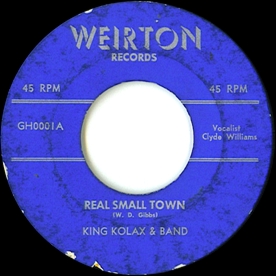
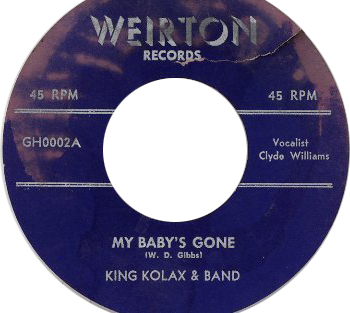
Clyde Williams (voc); Carl Vince (voc); King Kolax (tp, ldr); other musicians unidentified.
unknown location, late June 1958
| GH0001A | Real Small Town (W. D. Gibbs) [CW voc] | Weirton GH0001A | |
| GH0001B | Dream of Judy (W. D. Gibbs) [CV voc] | Weirton GH0001B | |
| GH0002A | My Baby's Gone (W. D. Gibbs) [CW voc] | Weirton GH0002A | |
| GH0001B | High, Hot, and Ready (W. D. Gibbs) [CW voc] | Weirton GH0002B |
A copy of Weirton GH0001, a 7-inch 45-rpm single, is in the collection of Steve Gronda. The only numbers to appear on the label are the matrix numbers. (Our thanks to Dan Kochakian for alerting us to this previously unknown item.) Weirton GH0002, also 45-rpm single, was discovered in 2006 by Lou Rallo. The label to side A of Rallo's copy of GH0002 is damaged, but we have displayed it here as it could be a mighty long time before another copy materializes. The composer credits on all four sides went to "W. D. Gibbs."
Clyde Williams had recorded with Kolax not long before, on the single for Stepheny. About Carl Vince, who sings on one of the four sides, we know nothing at all. We know little more about Weird Dock Gibbs and his company. Weirton kept operating, on a fitful basis, into 1961; at present https://www.discogs.com/label/1078895-Weirton-Records lists 10 45s. Weirton G 1010 by Dave "Baby" Tate included a tune credit to Gibbs (for "Moving," which hasn't turned up in copyright research), and Weirton G 1012, featuring a singer named Jack Carson, has one tune credited to Carson and Gibbs ("Wildwood, J. C." was copyrighted on December 28, 1958. The other side of G 1012 ("Carson Cries the Blues") was credited to Carson and Patterson, but published by "Weirton Pub. Co. of Ann Arbor." Gibbs also copyrighted "Re-Ette" on December 1, 1958. We don't know whether the tune was recorded, but one Weirette Rene, surely his daughter, was born less than two weeks earlier (she appears to have been married and divorced a couple of times, and has latterly been known as Weirette Rene Bean). One of the last Weirtons, if not the last, was released in 1961 as G 1130 by the Traveling Stars of Michigan, a gospel group. It's the only Weirton presently known that shows a location for the company: 126 East Spruce Street, Washington, Pennsylvania. Gibbs forfeited a $17.50 bond on a speeding ticket in Mansfield, Ohio in 1967 (New Journal, February 16, 1967, p. 35); his place of residence was then said to be Washington, Pennsylvania. He died at the age of 66 on October 4, 1990, and was buried in Reynoldsburg, Ohio. (For most of what we know about Weird Dock Gibbs, see https://www.findagrave.com/memorial/152697889/weird-d-gibbs). Armim Büttner did the copyright research on the four titles from Weirton 0001 and 0002, as well as the Jack Carson single and some other Weirton Pub. Co. items. He also found the mentions in Talent magazine.
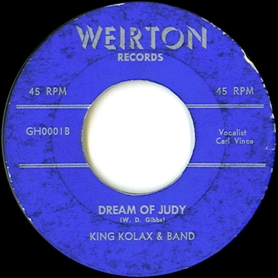
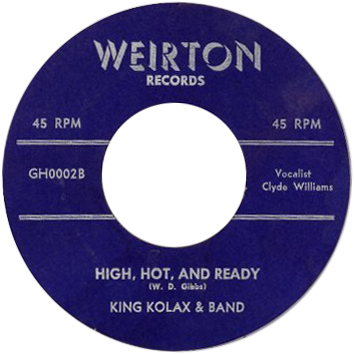
On May 10, 1958 Cash Box announced ("Stepheny to Enter Package Market," p. 84) that Stepheny had five LPs (all recorded in stereo, though initially pressed in mono) ready for release. Among albums "in production," according to Norman Forgue, was one with "Chicago jazz sounds of King-Kolax's big band." Maybe, when he got around to that project, Forgue looked at his budget (by then, he'd shelled out for two or three big-band sessions) and decided on a quintet? It was a quintet that accompanied a lounge singer named Harvey Ellington.
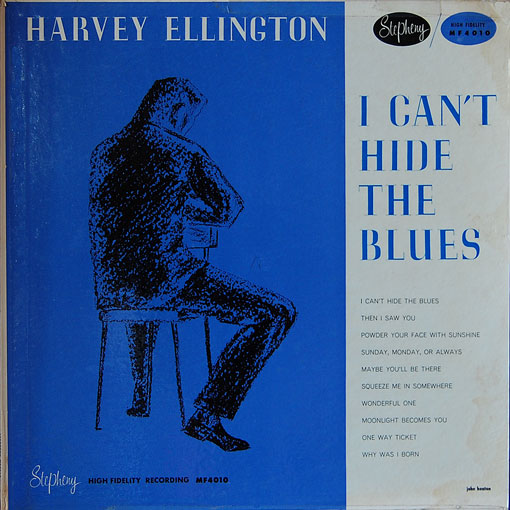
Harvey Ellington (whistling -1, voc) with King Kolax (tp, arr); Eddie Chamblee (ts); Prentice McCarey (p, arr); Mentho Martin (b); Paul Gusman (d).
Chicago, early September 1958
| I Can't Hide the Blues (Gilbert) | Stepheny MF4010 | |
| Why Was I Born (Kern-Hammerstein II) | Stepheny MF4010 | |
| Powder Your Face with Sunshine -1 (Lombardo-Rochinski) | Stepheny MF4010 | |
| Maybe You'll Be There* (Gallup-Bloom) | Stepheny MF4010 | |
| Then I Saw You* (McCarey) | Stepheny MF4010 | |
| One Way Ticket (McCarey) | Stepheny MF4010 | |
| Moonlight Becomes You* (Van Heusen-Burke) | Stepheny MF4010 | |
| Wonderful One (Grofé-Whiteman-Morris) | Stepheny MF4010 | |
| Sunday, Monday or Always (Van Heusen-Burke) | Stepheny MF4010 | |
| Squeeze Me in Somewhere* (McCarey) | Stepheny MF4010 |
We got the personnel from the liner notes to Stepheny MF 4010, an LP (the matrix numbers are J80P-9409 for Side 1 and J80P-9410 for Side 2) that was recorded, mastered, and pressed in early September 1958. The album is listed in Tom Lord's Jazz Discography, under Harvey Ellington's name, but among the musicians only Eddie Chamblee is identified.
We'd thought from the RCA Victor Custom Pressing codes (in the J series) that Stepheny MF 4010 was released in 1958. Though Stepheny LPs were hardly ever reviewed in the trades, Stepheny MF 4007 by Amanda Ambrose (a strong outing by a jazz pianist and singer) got an unmerited one-star dismissal (under "Pop") in Billboard on December 22, 1958 (p. 22). MF 4008, MF 4009, and MF 4010 were therefore 1958 recordings but 1959 releases.
Unfortunately we know nothing about Harvey Ellington, and the curt liner notes to Stepheny MF 4010 (written by "well known musician" Edward Hillman—a DJ in Cincinnati, and almost certainly a close relation to Mort Hillman) have nothing to teach us. Ellington has a "loungey" style and his intonation is sometimes rather unsure. The drummer's last name is spelled "Gussman" on the liner. Mentho Martin is the bassist previously known to us as "Cowboy" (returning to the King for this session?). The liners identify Kolax and McCarey as the arrangers. Alongside the standards (some of them on the sappy side) are three originals by Prentice McCarey, a ballad ("Then I Saw You") and two blues ("One Way Ticket" and "Squeeze Me in Somewhere").
Stepheny LPs (when the tracks were new; a couple of the company's albums were compilations that included some older material) were recorded in stereo. Presumably this one was as well. The label used a different number series (the LR 8000s) for the stereo releases, was choosy about which ones it put out in the format, and sometimes delayed them. In the end, just 5 Stepheny LPs got stereo versions, and more than half of the company's albums were released in mono only. By the time MF 4010 hit the shelves, the company had given up on stereo releases.A good basic source on Stepheny LPs, albeit dated (it's nearly as old as RSRF) is David Edwards and Mike Callahan's Stepheny Album Discography, still at https://www.bsnpubs.com/chicago/stepheny.html.
The recording engineer is identified on MF4010—but not the studio. Kolax is in good form on the session and is given the best recorded sound he would ever get. Both Kolax and Chamblee solo on "Maybe You'll ...", "Then I Saw You", "Moonlight ..." and "Squeeze ...". Chamblee is the only soloist on "One Way Ticket." McCarey's accompaniments are well recorded and consistently interesting, and throughout the LP Chamblee and Kolax play little obbligati and nicely arranged background figures.
Recording sessions for the Stepheny label (in 1959, the company was noticeably decelerating both its LP and its single releases) would only go so far. A further sign of weak demand for King Kolax's services was the defection of his longtime pianist Prentice McCarey, who began taking gigs on his own. On November 20, 1958, Local 208 accepted and filed McCarey's "indefinite" contract with Julian's Restaurant.
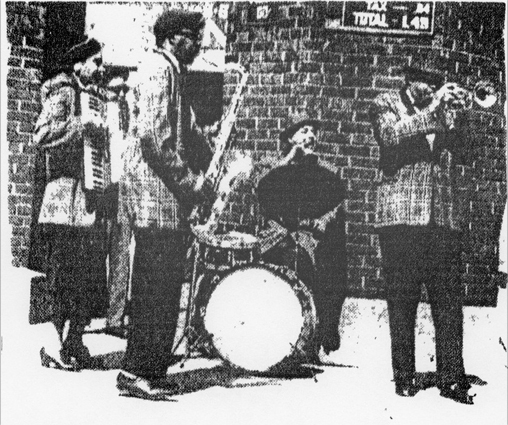
On April 14, 1959, the new owner of the Chicago White Sox, Bill Veeck, hired a King Kolax quartet to serenade the fans outside Comiskey Park before the team's home opener. Veeck seems to have been pleased with the fan response, because he gave Kolax a regular gig between innings during home games that season—and the White Sox went to the World Series. The Defender ran a photo of the band (on what was obviously not a warm day) on April 18. In June, the Pittsburgh Courier caught up with the story. It's clear who their source was, because Jump Jackson took the credit for the gig. In any event, we learn that in June the band consisted of Kolax, trumpet; Bill Casimir, tenor sax; Cleve Nickerson, accordion; and Jump Jackson, drums. There was even talk about Veeck taking the band on the road with the Sox—which to our knowledge did not happen (Ted Watson, "In Comiskey Park: 'Jump' Jackson Pulled a First," Pittsburgh Courier, June 20, 1959, p. 34).
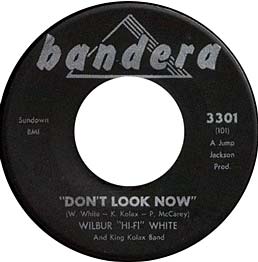
In 1960, Kolax resurfaced on Bandera, a small company on the South Side of Chicago. Bandera maintained an R&B series that ran from 2501 to 2515. Besides his appearance on Bandera 3301, which is now documented, Kolax could have been on 2513 or 2514. More research is still needed.
From May 14 through 19, 1960, King Kolax was one of several local musicians called on to reinforce the Ernie Fields band during a package show produced by Al Benson. David Sherr, a master of several winds, was then an 18-year-old playing tenor saxophone in the Fields aggregration. Sherr's reminiscences of the gig are included in "Stories from the Road," available at http://belairjazz.org/stories-from-the-road.html#:
The Regal Theater. Carpenters were still working on the bandstand when we arrived. Because we had to back up the other acts, four local musicians had been hired to augment our band: Bugs MacDonald, alto sax; John Avant, trombone; and Paul Serrano and a man the others called “Kolax” on trumpets. Kolax? As in King Kolax? It couldn’t be; he’d be at least a hundred and this cat didn’t look more than about sixty.
One more excerpt to give the overall flavor of Sherr's reminscences, which everyone should read in their entirety.
King Kolax says he’s forty-three. He’s a very interesting guy and I began at once to learn from him. He offered advice on a number of subjects, all of which had been ignored in my education up to that point. In fact, I’m not sure it would have been legal for the schools even to touch on some of the subjects. Except for a couple of words that seemed to find their way into every sentence, he hardly swore at all.
King Kolax never delivered on his offer to take David Sherr to sit in at Budland. But by this time the basement club was in terminal decline as a live music venue (for a capsule history, see our Sun Ra page).
Singer Wilbur "Hifi" White was often seen in smaller Chicago clubs, starting in the late 1950s. He worked McKie's Disc Jockey Lounge for most of 1960; for most of his run, he was accompanied by Bobby Blevins' organ trio. Around 1966 he began to promote concerts and dances.
Wilbur "Hifi" White (voc) with King Kolax (tp, ldr); Bill Atkins (as); Johnny Board (ts -1; fl -2); McKinley Easton (bars); Prentice McCarey (p); Walter "Chippy" Cole (b); Red Saunders (d).
Chicago, August 1960
| 101 | Don't Look Now (White-Kolax-McCarey) -1 | Bandera 3301, Wolf 120.297 [CD] | |
| 102 | In the Center of My Heart (White-Kolax-McCarey) -2 | Bandera 3301 |
Bandera, which was in business from 1958 to 1961, was a small operation run by Vi Muszynski and Bernie Harville. Initially Bandera depended on Vee-Jay for national distribution, but after turning Jerry Butler and the Impressions over to Vee-Jay's Falcon/Abner subsidiary (all they got in return was two tracks by the Impressions for release on Bandera), Muszynski and Harville thought better of that arrangement. Bandera 3301 was a 45-rpm single released probably in late 1960. Our information about the original release (including the personnel list) is taken from the Mohr-Flückiger-Demeusy Files. MFD identify the bassist simply as "Chippie." Walter Cole, who had replaced Jimmy Richardson in the Red Saunders band, was also known (at times) as Walt Champion. "In the Center of My Heart" has a prominent flute part; "Don't Look Now" features a tenor sax solo—both are by Johnny Board.
In the 1990s, "Don't Look Now" was reissued on an Austrian CD, Wolf 120.197 [CD], The La Salle Chicago Blues Recordings Volume II. Wolf says that the accompaniment is by a King Kolax band, but gives the date as 1959 and credits Armand "Jump" Jackson with playing the drums. The confusion arose because Jump Jackson produced the session for Bandera. Indeed, Wolf gives no release number for "Don't Look Now" on the La Salle label, and the track on the Wolf collection is the same one that we know from the Bandera single. At any rate, King K did get around to recording for LaSalle, behind the vocal group The Chaunteurs.
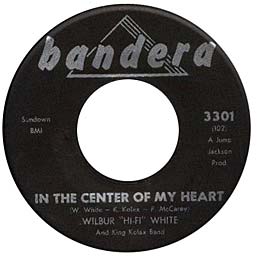
Advertisements in the Chicago Defender, starting on October 8, 1960, had King Kolax ("and His Hot Trumpet") as the M.C. at Club Evergreen, located at Larrabee and Clybourn. The "Jazz Jamboree" show, in a variety format now on the verge of extinction, included Danny Overbea, Nate Strong and his All Stars, plus an exotic dancer and a ventriloquist. The show kept going for at least a month.
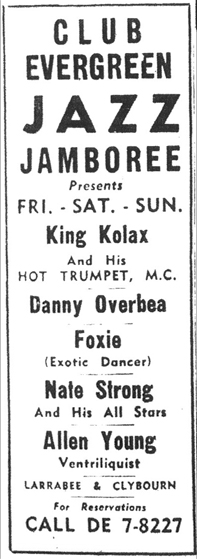
During the 1960-1961 holiday season, King Kolax was temporarily a sideman in a big band led by Red Saunders. The marquee event for this ensemble was the inaugural ball for Illinois Governor Otto Kerner, held in Springfield on January 9, 1961 ("Saunders' Band Will Play Governor's Ball," Pittsburgh Courier, December 24, 1960, p. 24). Prentice McCarey was now working regularly with Red. A band with James Spaulding sitting next to Leon Washington and Mac Easton, and King Kolax next to Charles Gray and Fip Ricard, must have been something to see and hear, but for obvious reasons the configuration wasn't a stable one.
The Chaunteurs: Sollie McElroy (lead tenor); Eugene Record (1st tenor); Robert Laster (2nd tenor); Clarence Johnson (baritone); Eddie Reed (bass); accompanied by King Kolax (tp -1, ldr); unidentified (ts); unidentified (org); unidentified (eg); unidentified (eb); Armand "Jump" Jackson (d).
Chicago, 1961
| A-101 | New Rockin' Baby | La Salle 501 | |
| A-102 | I'll Do What You Want Me to Do | unissued | |
| A-103 | Wishin' Well (Austell) -1 | La Salle 501 | |
| ? | untitled | unissued |
Our discographical information, except the vocal lineup, is derived from the Kurt Mohr files, now in the possession of Soul Bag magazine, with some help from a recent YouTube posting of "Wishin' Well" (see http://www.youtube.com/watch?v=6pSmHM7NG1w). La Salle 501 was a 45-rpm single, released at the time. According to Mohr, the Chaunteurs also made two singles for Vee-Jay (one of these was Vee-Jay 519, issued in 1963). The vocal lineup from Robert Ferlingere's Discography of Rhythm and Blues and Rock 'n Roll Vocal Groups, (2nd ed., Vol. 1, 1992) and Bob Pruter's Doowop: The Chicago Scene.
On "Wishin' Well," a bouncy number tending toward soul music, there is a long solo by the tenor saxophonist. As was his habit on such occasions, King Kolax is heard only during the introduction and during several accompanying riffs.
While The Chaunteurs never gained much fame, Sollie McElroy was the former lead singer of the Flamingos (they had recorded with King Kolax back in January 1953—see our Al Smith page for more of their early recordings) and Eugene Record would go on to form the soul vocal group the Chi-Lites.
Around 1961, King Kolax became A&R man for the the Marvello label, which was owned by James P. Johnson, a veteran of the Chicago recording scene. A rundown of all Marvello releases is included as Appendix A. Only the sides by the Vondells, which mention King Kolax on the label, are in the main body of the discography; we have no evidence that he played on any other Marvellos. Marvello seems to have functioned until 1964 or 1965.
Jerry Butler (voc) with orchestra directed by Riley Hampton: King Kolax (tp); Paul Serrano (tp); Sonny Turner (tp); Morris Ellis (tb); William Corti (tb); Johnny Young (p); Curtis Mayfield (eg); Lefty Bates (eg); Earl Backus (eg); Quinn Wilson (b); Alrook "Al" Duncan (d).
Universal Recording, Chicago, March 23, 1961
| 61-1876 | I'm A Telling You | Vee-Jay 390, Vee-Jay LP 1038, Vee-Jay LP 1048, Charly [Br] LP 1005, Charly [Br] CD 54, Chameleon CD 74807, Vee-Jay CD 700 | |
| 61-1877 | The Wicked Man | Vee-Jay LP 1038 |
Session information from the Mohr-Flückiger-Demeusy files, which got the old Vee-Jay LP releases wrong. MFD listed William Corti on an "unidentified instrument." As one Bill Corti was credited with first trombone on one of the sessions for a Fredie Wayne LP on a Chicagoland label (Stepheny MF4008, probably recorded in 1958), we know what he was playing on this session.
Vee-Jay 390 was a 45-rpm single released in July 1961. The flip was from a 1960 session not including King Kolax.
Vee-Jay LP 1038 was called Aware of Love and was released in 1961. Vee Jay LP 1048 was called The Best of Jerry Butler, and was released in 1962. Charly LP 1005 was titled Up in Love, and was released in 1980. Charly CD 54,Soul Workshop, was released in 1987. Chameleon 74807, He Will Break Your Heart: Two Decades of Smash Hits, was released in 1989. Vee-Jay CD 700,The Iceman, was released in 1992.
McKinley "Soul" Mitchell (voc); with King Kolax (tp, arr); unidentified (tp); unidentified (ts); George Hunter (bars); unidentified (org); Curley Palmer (eg); Johnny Dallico (b); Steve Boswell (d).
Chicago, January 1, 1962 [?]
| 2029 (vinyl) / ZTSC 89413-IKA [4031*] | The Town I Live In (Rice-Mitchell-Dodd) | Midas no #, One-derful! 4804, One-derful LP 1002, Toddlin Town 117*, President [Br] 125, President [Br] LP 1005, P-Vine Special [J] PLP-9008 | |
| 2030 (vinyl) / ZTSC 89412-IKA [4032*] | No Love (Like My Love) (Rice-Mitchell-Dodd) | Midas no #, One-derful! 4804, One-derful LP 1002, Toddlin Town 117*, President [Br] 125, President [Br] LP 1005 |
According to Robert Pruter in Chicago Soul, p. 214, "hard soul" singer McKinley Mitchell recorded with Kolax's band, then took the material to George Leaner, who issued it to launch his One-derful! label in March 1962. We are skeptical about the recording date. Who records on New Year's Day?
On "The Town I Live In," King K and the other wind players are restricted to standard soul horn arrangements. His trumpet is clearly audible in the ensemble, however. The unidentified organist gets the most prominent instrumental part. For a Web site on McKinley Mitchell that includes a Real Audio file of "The Town I Live In," check http://www.melingo.com/thesoulnet/mitchell.htm.
On the One-derful! single (4804), the matrix numbers in the 2000 series are listed as shown in the trail-off vinyl. They are reversed on the labels. One-derful! 4804 also carries numbers with a ZTSC prefix, indicating that the records were mastered and pressed by Columbia. These appear on the label and in the vinyl, except that the IKA suffix is only in the vinyl. On the Toddlin Town release, the matrix numbers were changed to 4031 and 4032. These are the same recordings that were issued on One-derful!, not alternate takes or different versions.
P-Vine Special PLP-9008, McKinley "Soul" Mitchell, was a compilation of 12 tracks derived from the One-derful! label. It was released in Japan in 1979.
Also in January 1962, King Kolax landed a one-week gig leading the band at the Tivoli Theatre; his contract was accepted and filed by Local 208 on January 18. He would get another one-week engagement at the Tivoli (contract posted on August 16). These would be his last contracts as a member of Local 208, which merged with Local 10 in January 1966.
McKinley "Soul" Mitchell (voc) with King Kolax Band: King Kolax (tp); unidentified (tb); unidentified (ts); George Hunter (bars); unidentified (org); Curley Palmer (eg); Johnny Dallico (b); Steve Boswell (d).
Chicago, April 6, 1962
| 2031/ ZTSC 82681 | All of a Sudden (Rice-Mitchell-Dodd) | One-derful! 4808, One-derful! 4810, One-derful LP 1002, President [Br] 125, President [Br] LP 1005, P-Vine Special [J] PLP 9008 | |
| 2032/ ZTSC 82682 | I Found an Angel | One-derful! 4808, One-derful LP 1002, President [Br] 125, President [Br] LP 1005 |
"All of a Sudden" is a brooding slow blues on which the organ again dominates the arrangment but King K's trumpet occasionally breaks through the ensemble.
Mitchell continued to record for One-derful! but his later sessions were arranged by Monk Higgins, and King Kolax did not play or direct the band on them.

Otis Rush (voc, eg); King Kolax (tp); Sonny Turner (tp); Murray Watson (tp); Milton Bland aka Monk Higgins (tb); Johnny Board (ts); Abb Locke (ts); Lafayette Leake (p, org); Lefty Bates (eg); Jack Meyers (eb); K. C. Jones (d).
Chicago, September 6 and 7, 1962
| UV 7110 | Homework (A. Perkins-D. Clark) | Duke 356, MCA 10667 [CD] | |
| Don't Let It End This Way | unissued | ||
| untitled | — | ||
| UV 7113 | I Have to Laugh (O. Rush-D. Clark) | Duke 356, MCA 10667 [CD] |
Our basic information on the session comes from Leadbitter and Slaven's Blues Records 1943-1966. From the composer credits, we infer that R&B publicist and impresario Dave Clark was in charge of the session.
Our information about MCA 10667, a CD called Best of Duke-Peacock, comes from the online All Music Guide; the rest of the CD is by other artists.
When this session took place, Otis Rush, who had recently left Chess and moved to Duke, had recently started an extended engagement at the Castle Rock (his "indefinite" contract posted with Local 208 on September 6). Before that, he'd been at the Silver Dollar Lounge (indefinite contract accepted and filed on February 15).

The Vondells: Lowrell Simon, Glenn Murdock, William "Butch" McCoy, Jesse Dean, James Neely (voc); with King Kolax and Combo: King Kolax (tp, arr); unidentified (ts, bars, org, eg, eb, d.)
Chicago, 1963 or 1964
| 5005-A | Errand Boy | Marvello 5005 [sic] | |
| 5005-B | Then I Knew | Marvello 5005 [sic] | |
| (no #) | Lenora | Marvello 5006A | |
| (no #) | Valentino | Marvello 5006B |
Marvello 5006 was released in July 1964, and this soul music release was a local hit. Labels are reversed on some copies of Marvello 5006; the vocal group sings "Lenore" even though the title reads "Lenora." The release date for the Vondells' Marvello 5005 is not known. Just to keep everyone on their toes, the label had put out another 5005 in late 1963 or early 1964, by Earl Ezell & Combo (see below). Our source for the vocal lineup is Robert Pruter, Chicago Soul, p. 278. There apparently were other brass players on the date besides King Kolax, but the instrumental lineup still needs researching.
In 1966, King K landed a recording gig with the prominent soul-jazz organist, Brother Jack McDuff. Kolax and some other Chicago-based musicians, such as trombonist John Watson, trumpeter Fred Berry, saxophonist Lonnie Simmons, vibraphonist Bobby Christian, and guitarist Roland Faulkner, were probably recommended for the date by Red Holloway, who had been in New York since the early 1960s and worked as a regular member of McDuff's group from 1963 to 1966. Of course, Jack McDuff (formerly Eugene McDuffy) would have met some of them in Chicago during the 1950s. Fred Berry, who worked a lot of soul sessions, had also been the trumpet player in the first Roscoe Mitchell Quartet.

Brother Jack McDuff (org); King Kolax (tp); Fred Berry (tp); John Watson (tb); Red Holloway (ts); Lonnie Simmons (bars); Bobby Christian (vib, perc); Roland Faulkner (eg); Loyal J. Gresham (eb); Bob Guthrie (d); J. J. Jackson (arr, cond).
New York City, August 22, 1966
| 10762 | Teardrops from My Eyes | Atlantic SD1472, Collectables 6405 [CD] | |
| 10763 | This Bitter Earth | Atlantic SD1472, Atlantic 5075, Collectables 6405 [CD] | |
| 10764 | Tobacco Road | Atlantic SD1472, Atlantic 5075, Collectables 6405 [CD] | |
| 10765 | Blowin' in the Wind | Atlantic SD1472, Collectables 6405 [CD] |
Our information about this session comes from Tom Lord's Jazz Discography. Atlantic SD1472 was an LP titled Tobacco Road; Atlantic 5075 was a 45-rpm single. Collectables 6405, a CD released in 1999, combines Tobacco Road with another McDuff album for Atlantic, Do It Now!
The rest of the Tobacco RoadLP was completed at a session on August 23 on which McDuff was backed by Danny Turner (ts, fl), Calvin Green (eg), and Joe Dukes (d). McDuff signed with the Chess brothers' Cadet label in 1968, recording in Chicago in 1968-1969 and again in 1971, but King Kolax was not involved in any of these sessions. He did get on to one session for Checker, however.
Willie Mabon, voc, p; also hca -1); with King Kolax (tp); William Brimfield (tp); Neal Green (ts); Cash McCall (eg); Lefty Bates (eg); Eugene Howell (b); Al Thompson (d).
Chicago, October 24, 1969
| 18198 | Troubles | unissued | |
| 18199 | Come Back Little Daddy | Checker 1235 | |
| 18200 | I Won't Be Back No More -1 | Checker 1235 |
King Kolax participated in Willie Mabon's last session for Checker (already under the control of General Recorded Tape corporation; the Chess brothers had sold the company earlier in the year). All details are from Leadbitter, Fancourt, and Pelletier, Blues Records 1943-1970: L-Z (published 1994). LFP spell Neal Green's first name as "Neil." Cash McCall's real name was Morris Dollison. Interestingly, Billy Brimfield and Neal Green had previously participated in Willie Mabon's 1964 session for USA under Red Saunders' direction. However, there is some question about the correct personnel for this date; further listening is called for.
Gene Ammons (ts); King Kolax (tp); Wallace Burton (p); George Freeman (eg); Chester Williamson (b); Bob Guthrie (d).
TV Broadcast, Just Jazz Show, Chicago, July 1970
| Jug's Delight | Session SE 126 | ||
| Madame Queen | Session SE 126 | ||
| Didn't We? | Session SE 126 | ||
| The Jungle Strut | Session SE 126 |
Our information comes from Lord's Jazz Discography. Session SE126 was put out by the infamous Japanese bootleg conglomerate, Ozone/Alto/Session, in the 1970s; there is no connection with the Session label that was active from 1943 to 1947. The title, Hooray for John Coltrane, indicates whose broadcast material occupied the rest of the LP.
According to Bob Porter, when Gene Ammons was released from prison (this was late October 1969—he had spent 7 years in the slammer on a drug charge), he put together the band that was heard on this recording. King Kolax did not travel with the band, and left it for good a few days after the telecast; the rest of the band continued with Jug for some time thereafter. Porter recalls that Ammons played an electric sax (Varitone or comparable model) on the telecast. There may be video releases not mentioned here. Also, July 1970 is more likely the date of first broadcast than the recording date; to be researched.
About a month later, King Kolax returned to the studio for his last recording session.
Roosevelt Sykes (p, voc); King Kolax (tp -1); Oett "Sax" Mallard (ts-2; cl-3); Robert Jr. Lockwood (eg); Dave Myers (eb); Fred Below (d).
Sound Studios, Chicago, August 10 and 11, 1970
| Feel like Blowing My Horn -1, 2 | Delmark DS 632, DE-632 [CD] | ||
| My Hamstring's Poppin' -2 | Delmark DS 632, DE-632 [CD] | ||
| I'm a Nut -2 | Delmark DS 632, DE-632 [CD] | ||
| Blues Will Prank with Your Soul -2 | Delmark DS 632, DE-632 [CD] | ||
| Jubilee Time [alt.] -1, 2, 3 | Delmark DE-632 [CD] | ||
| All Days Are Good Days [alt.] -1, 2 | Delmark DE-632 [CD] | ||
| Sykes' Gumboogie -1, 2 | Delmark DS 632, DE-632 [CD] | ||
| Rock-A-Bye Birdie -2 | Delmark DS 632, DE-632 [CD] | ||
| Moving Blues -2 | Delmark DS 632, DE-632 [CD] | ||
| Don't Bat Your Eye -1, 2 | Delmark DE-632 [CD] | ||
| All Days Are Good Days -1, 2 | Delmark DS 632, DE-632 [CD] | ||
| Eagle Rock Me, Baby -1, 2 | Delmark DS 632, DE-632 [CD] | ||
| Jubilee Time -1, 2, 3 | Delmark DS 632, DE-632 [CD] | ||
| Love the One You're With -2 | Delmark DE-632 [CD] |
Delmark DS 632 was an LP released in 1973. Delmark DE-632 is a CD reissue from 1997. Our information is from the liner notes to the reissue. This was the valedictory studio session for both King K and Sax Mallard.
In subsequent years, King Kolax held an office at the Chicago Federation of Musicians. Musicians Union rules forbid union officials from working gigs. Pianist Allan Roberts recalls doing a few live performances with Kolax for the Union—these were somewhat misleadingly called "transcriptions" and were intended to promote live music. On one occasion King Kolax sat in with Roberts' group in a club. King Kolax retired completely from playing around 1981. He died in Roseland Hospital in Chicago on December 18, 1991, after suffering from Alzheimer's disease for some time. He left 6 children, 23 grandchildren, and 8 great-grandchildren.
Prentice McCarey, who had been a mainstay of the Kolax combo from 1951 through 1957, died in Chicago on November 13, 1992.
| Release Number | Artist | Title | Matrix Number | Release Date |
| 98-377 | The Marvellos | I Need a Girl | 222-223 | Jan. or Feb. 1961 |
| 98-377 | Dotty Tillmann [sic] Vocalist | Denny Tillmann Trio | Cloud Nine | 221-248 | Jan. or Feb. 1961 |
| 98-377 [!] | The Marvellos | Red Hot Mama | 221-200 | Jan. or Feb. 1961 |
| 98-377 [!] | Dotty Tillmann Vocalist | Denny Tillmann Trio | Down by the Shore | 222-222 | Jan. or Feb. 1961 |
| 5001 | The Populairs | I Lost My Heart | 5001-A | |
| 5001 | The Populairs | Island of Paradise | 5001-B | |
| 5002 Ser. 98-377 [!!] on label |
Laney McDonald's Swinging Crew | Recitation Laney McDonald | State Gone Broke | 5002-A | |
| 5002 Ser. 98-377 on label |
Laney McDonald's Swinging Crew | Vocal Theresa Blunt | Weatherman's Woe | 5002-B | |
| 5003 | Laney McDonald's Swinging Crew | Morning Dew | ||
| 5003 | Laney McDonald's Swinging Crew | Clock Tock | ||
| 5004A | Earl Ezell Combo | Fascinating Dena | 1409-01A | |
| 5004B | Earl Ezell Combo | Jewel | 1409-1-B | |
| 5005-A | Earl Ezell & Combo | Aunt Woo Wa | M. 5005-A | |
| 5005-B | Earl Ezell & Combo | Wake Up Mama | M. 5005-B | |
| 5005 [sic] | The Vondells | King Kolax & Combo | Errand Boy | 5005-A [sic] | |
| 5005 [sic] | The Vondells | King Kolax & Combo | Then I Knew | 5005-B [sic] | |
| M-5006A | The Vondells | King Kolax & Combo | Lenora | (no #) | July 1964 |
| M-5006B | The Vondells | King Kolax & Combo | Valentino | (no #) | July 1964 |
| 5007 | James Scales and All Stars | Baron vocal | Ser-vi-tude | 5007-A | |
| 5007 | James Scales and All Stars | Verro Stomp | 5007-B | |
| 5008-A | James Scales and All Stars | Scagg's Ville | ||
| 5008-B | James Scales and All Stars | Hot Souse |
The first two releases on Marvello were both numbered 98-377. Each had an A side by The Marvellos, a doowop group accompanied by a rhythm section, and a B side by Dotty Tillman, accompanied by her husband's trio. This was probably not the original plan! A Chicago Defenderclipping on Dotty Tillman, dated February 18, 1961, establishes the date—and states that "Cloud Nine" and "Down by the Shore" were two sides of one single, as was the custom...
Dotty Tillman, who sang on the 98-377s, was accompanied by her husband Denny on piano and organ, plus an unidentified guitarist and drummer. Both of her numbers are jazz vocals. Denny Tillman had previously participated in a number of studio sessions behind other singers and vocal groups for the tiny Drexel label, which was in operation from 1954 to 1958.
Both 98-377s have been redone as "repros," on the strength of The Marvellos' contributions.
The first Marvello in the main series, 5001, was by another, rather saggy doowop group called The Populairs. "I Lost My Heart" is a typical sentimental ballad; "Island of Paradise" features a "Duke of Earl" style monologue from the bass singer; both sides are overrecorded and feature really really loud electric guitar. Mastering and pressing were handled by Shelton (i.e., the Chess Studios). Most Marvellos would end up boasting better production quality than this.
Marvello 5002 by Laney McDonald's Swinging Crew is novelty R & B. The label (again!) carries release # 98-377, but clearly the intention was to show 5002, as can be seen in trail-off vinyl. "State Gone Broke" features McDonald's monologue of complaint (one that may again be relevant in Illinois in 2015...) about the state being too broke to give him another welfare or unemployment check, over a "Hoochie Coochie Man" background. "Weatherman's Woe" is a number about poor prediction sung by Theresa Blount. Instrumentation on 5002 is tenor sax, organ, electric guitar, bass, and drums; we have not yet heard Marvello 5003.
A little later on, there were two Marvello 5005s, one by the Vondells (see above for specifics) and one by Earl Ezell and his band: alto sax, piano, string bass, and drums/percussion. An excerpt from "Aunt Woo Wa," a modal number featuring Ezell's alto sax and heavy percussion, makes the influence of late 1950s Sun Ra apparent. This is confirmed by a recording of its flip side, "Wake Up Mama," provided by Chris Trent. From 5004, "Fascinating Dena" is a passionate jazz ballad and "Jewel" a bright bebop number with more of that percussion. Ezell had been a member of Ra's rehearsal groups in the earlier part of that decade, and obviously kept in touch with happenings Ra-ological. Ezell signed with Marvello in late 1963 and his Marvello 5005 was released in 1964. Ezell later converted to Islam and changed his name to Ahmad Salaheldeen; a concert listing in the Chicago Defender from 1973 already refers to him by his later name.
A second Marvello artist in the Sun Ra orbit was veteran alto saxophonist James Scales, who back in 1947 had played in Fletcher Henderson's band at the Club DeLisa back. Courtesy of Alex Greene, we have been able to hear a dub of Marvello 5007. The label to 5007 gives the personnel as: J. Scales (alto), R. Cooper (tenor), V. Allen (baritone), L. Dallas (trumpet), L. Leak (piano), E. Demus (bass), F. Cashmir (guitar), and G. Walker (drums). V. Allen is Van Allen, L. Dallas is probably Dallas Leavell, L. Leak is Lafayette Leake, s. Cashmir is Sam Casimir, and E. Demus is definitely Earl Demus. Scales solos briefly on "Ser-Vi-Tude," a rather spooky number featuring a vocal by Baron and a hypnotic electric piano vamp by Lafayette Leake. "Verro Stomp" gives Scales and the other horn players a little room to stretch out. Both numbers show the clear influence of Sun Ra's mid-1950s Arkestra; Scales had been a part-time member for several months in 1956. "Verro Stomp" was so titled because not long before his Marvello sessions, Scales had cut four sides for the tiny Verro label; these were advertised in the Defender in November 1964. More recently, Chris Trent provided us with a dub of Marvello 5008. "Scagg's Ville" is a piece in what was then called the Blue Note style, with a Middle Eastern ambience. "Hot Souse" is a bebop number taken at a frantic tempo, featuring solos by the leader, R. Cooper on tenor sax, and Lafayette Leake on piano.
Sonny Parker (voc); Paul Renfro (ts); Pick Gordon (p); Monty Morrison (b); unidentified (d).
Los Angeles, December 1948
| HCO 3446 | Tossin' and Turnin' | Columbia 30154, Blue Moon [Sp] BMCD 6003 | |
| HCO 3447 | Lay Right Down and Die | Columbia 30151, Blue Moon [Sp] BMCD 6003 | |
| HCO 3448 | Gamblin' Woman | Columbia 30154, Blue Moon [Sp] BMCD 6003 | |
| HCO 3449 | ? | unissued | |
| HCO 3450 | ? | unissued | |
| HCO 3451 | You Don't Know about Love | Columbia 30151, Blue Moon [Sp] BMCD 6003 |
In the past, these sides have been credited to a band that also included King Kolax and Jesse Perry (trumpets) and Archie Washington (alto sax). However, these musicians did not appear on the recording session, on which Sonny Parker was backed by tenor sax, piano, bass, and drums only (the only instrumentation listed in the Columbia files, and the only instrumentation that can be heard on the released sides). The confusion arose because King Kolax worked in Sonny Parker's band in Cincinnati earlier in the year. According to Jacques Demêtre in his obituary of Sonny Parker (Jazz Hot, no. 120, April 1957), Parker put together a band in 1948 to play the Cotton Club in Cincinnati. Parker sang and played the drums in that band. Accompanying the obit is a discography by Kurt Mohr, which notes that the Columbia archives give only ts, p, b, and d for accompaniment without naming the musicians, but that Sonny Parker had said that the records used his regular band from the Cotton Club—which did, of course, included Kolax, Perry, and Washington. Mohr hadn't heard the Columbia sides when he compiled this 1957 discography.
Columbia 30151 and 30154 were 78-rpm singles issued at the time. Jepsen's Jazz Records rates Kolax as merely "probable," and gives the location as Cincinnati, without an exact date. Lord provides nearly the information given here, including the two missing matrix numbers. Lord also has Sonny Parker playing drums, whereas the 1995 Spanish Blue Moon reissue—BMCD 6003, Sonny Parker: The Complete 1948-1953—features notes by Jacques Morgantini, who knew Parker, and lists the drummer as unidentified.
The recording date of December 1948 is inconsistent with King Kolax's presence, anyway; two months earlier, he had returned to Chicago, formed a new combo that included Vernel Fournier (drums) and "Whisky" Sheffield (bass)—he'd invited these musicians to come up from New Orleans—and was working a steady gig in Chicago.
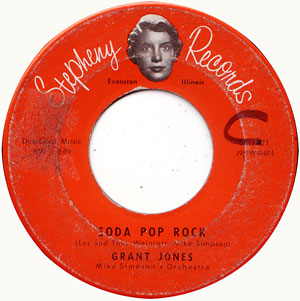
Grant Jones (voc) with Mike Simpson's Orchestra: Mike Simpson (ts, ldr); unidentified (tp); unidentified (p); unidentified (eg); unidentified (b); unidentified (d); unidentified (xyl -1); unidentified (vocal group).
prob. RCA Studios, Chicago, February 1958
| J9OW0484 | Soda Pop Rock (Weinrott-Weinrott-Simpson) | Stepheny SF1821, RST 1580 [CD] | |
| J9OW0485 | Pinball Machine (Weinrott-Simpson-Jones) -1 | Stepheny SF1821, RST 1580 [CD] |
Stepheny SF1821 was released on 45 in March 1958. It was cut during a flurry of activity in the first two months of 1958. Cash Box talked it up on March 15, 1958 (p. 22)—at least one Chicago-area DJ was spinning it. Meanwhile, it got a curt dismissal from Billboard on March 10, 1958 (p. 58). We had thought that Stepheny 1814 (see above) was also released in 1958, but it turns out that the company was advertising singles with release numbers up to 1817 in Cash Box in October 26, 1957. Reviews and even passing sales talk just couldn't keep up.
The liners to the only reissue of these sides, on the Austrian CD, Grant "Mr. Blues" Jones: In the Dark, issued in 1994 on RST 1580, say "probably King Kolax Band," but this turns out to be incorrect. (Grant Jones had worked and recorded with Kolax, and Kolax did record with Stepheny—but Kolax and Jones didn't work together for that label.)
The labels to Stepheny SF1821 credit Mike Simpson's Orchestra. Simpson, who played tenor saxophone, clarinet, and flute, and probably some other wind instruments, was doing a lot of studio work in the Chicago area during this period. He led the studio band on Stepheny 1840 (an early 1960 release) and may have made other contributions yet untraced.
The trumpet and the tenor sax are recessed on both sides while the jangly guitar dominates—it's a wannabe rock 'n roll session. Mike Simpson does get a solo on "Soda Pop Rock." The matrix numbers are from RCA, indicating that an RCA pressing plant (usually the one in Indianapolis, for items recorded in Chicago) produced the records in 1958. What was one meant to be a 0 in the first four characters of an RCA matrix number had become an O by this time: hence J9OW, not J90W, which is how RST rendered the prefix.
Grant Jones' last session (no longer billing him as "Mr. Blues") was a feeble effort to cross over into rock 'n roll. The aspirations to teen appeal were too obvious. "A-pop-a-zooey!" (the vocal group's refrain on "Soda Pop") won't be featured on any doowop nonsense syllable quiz.
Special thanks to the late Otto Flückiger for his extensive notes on King Kolax; to Kurt Mohr, who did exhaustive research on the Chance and Vee-Jay labels while compiling the Vee-Jay collections on the Top Rank label; to Soul Bag magazine, which now owns Kurt Mohr's files on King Kolax; to Bob Porter, John Szwed, Chris DeVito, Harold Ousley, and the late Vernel Fournier for information about King Kolax's various groups and their movements; to Dr. Robert Stallworth, Steve Gronda, and Lou Rallo for unearthing King Kolax singles previously unknown to discography; and to Fred Kaz for his reminiscences about King Kolax (email communication, April 20, 2010).